Nurses' Attitudes in Supporting Clients With Substance Misuse
VerifiedAdded on 2022/08/14
|33
|9175
|25
AI Summary
Contribute Materials
Your contribution can guide someone’s learning journey. Share your
documents today.
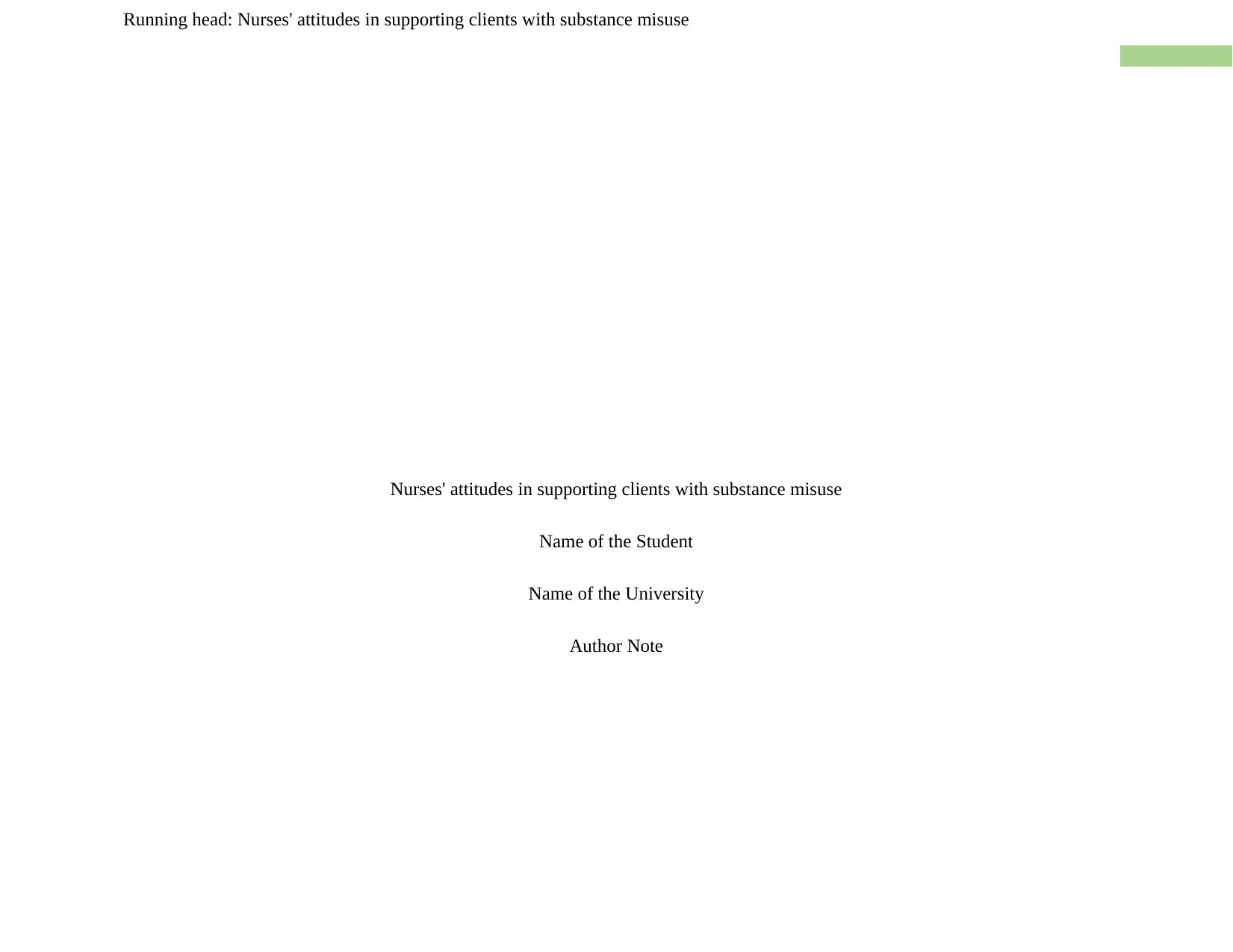
Running head: Nurses' attitudes in supporting clients with substance misuse
Nurses' attitudes in supporting clients with substance misuse
Name of the Student
Name of the University
Author Note
Nurses' attitudes in supporting clients with substance misuse
Name of the Student
Name of the University
Author Note
Secure Best Marks with AI Grader
Need help grading? Try our AI Grader for instant feedback on your assignments.
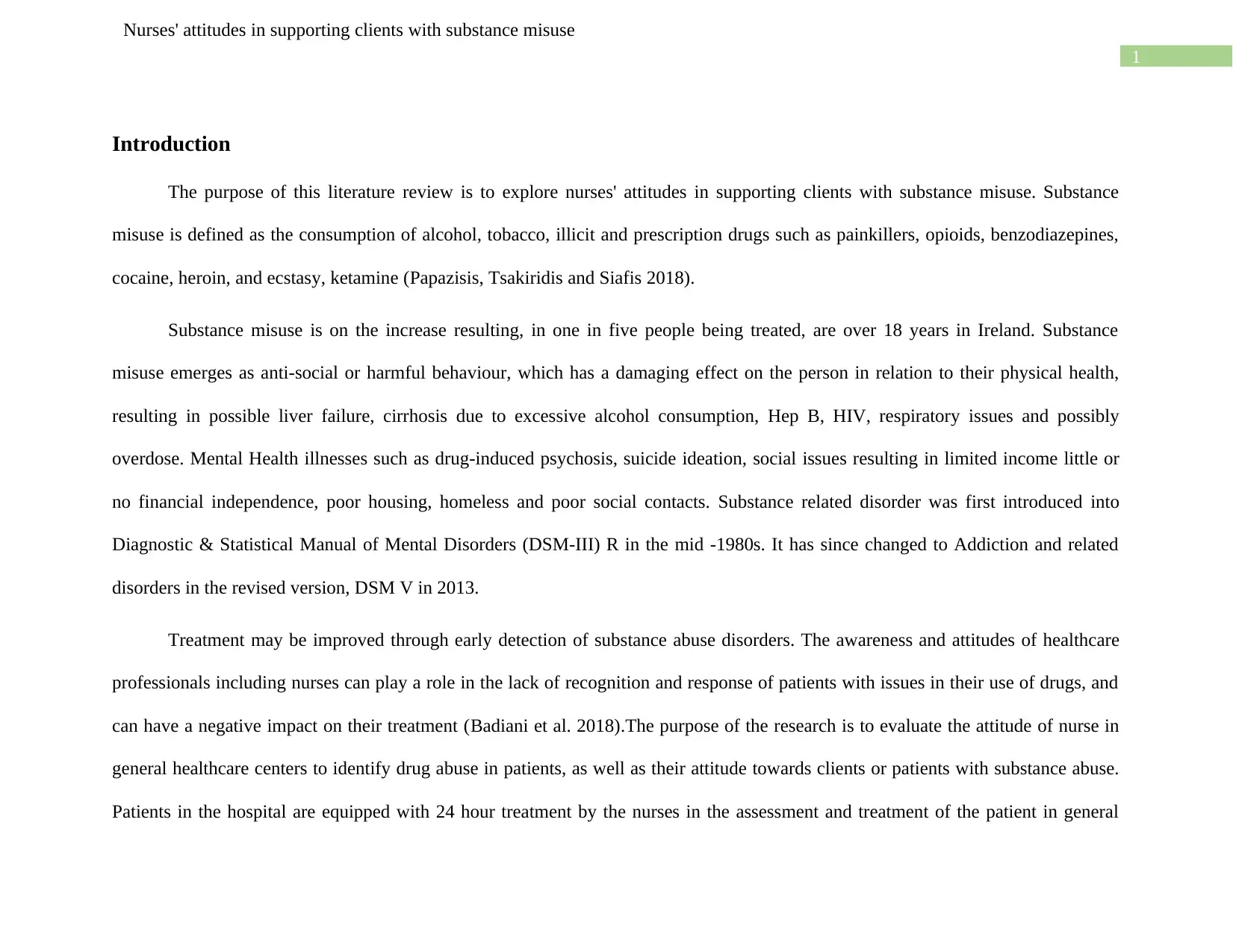
1
Nurses' attitudes in supporting clients with substance misuse
Introduction
The purpose of this literature review is to explore nurses' attitudes in supporting clients with substance misuse. Substance
misuse is defined as the consumption of alcohol, tobacco, illicit and prescription drugs such as painkillers, opioids, benzodiazepines,
cocaine, heroin, and ecstasy, ketamine (Papazisis, Tsakiridis and Siafis 2018).
Substance misuse is on the increase resulting, in one in five people being treated, are over 18 years in Ireland. Substance
misuse emerges as anti-social or harmful behaviour, which has a damaging effect on the person in relation to their physical health,
resulting in possible liver failure, cirrhosis due to excessive alcohol consumption, Hep B, HIV, respiratory issues and possibly
overdose. Mental Health illnesses such as drug-induced psychosis, suicide ideation, social issues resulting in limited income little or
no financial independence, poor housing, homeless and poor social contacts. Substance related disorder was first introduced into
Diagnostic & Statistical Manual of Mental Disorders (DSM-III) R in the mid -1980s. It has since changed to Addiction and related
disorders in the revised version, DSM V in 2013.
Treatment may be improved through early detection of substance abuse disorders. The awareness and attitudes of healthcare
professionals including nurses can play a role in the lack of recognition and response of patients with issues in their use of drugs, and
can have a negative impact on their treatment (Badiani et al. 2018).The purpose of the research is to evaluate the attitude of nurse in
general healthcare centers to identify drug abuse in patients, as well as their attitude towards clients or patients with substance abuse.
Patients in the hospital are equipped with 24 hour treatment by the nurses in the assessment and treatment of the patient in general
Nurses' attitudes in supporting clients with substance misuse
Introduction
The purpose of this literature review is to explore nurses' attitudes in supporting clients with substance misuse. Substance
misuse is defined as the consumption of alcohol, tobacco, illicit and prescription drugs such as painkillers, opioids, benzodiazepines,
cocaine, heroin, and ecstasy, ketamine (Papazisis, Tsakiridis and Siafis 2018).
Substance misuse is on the increase resulting, in one in five people being treated, are over 18 years in Ireland. Substance
misuse emerges as anti-social or harmful behaviour, which has a damaging effect on the person in relation to their physical health,
resulting in possible liver failure, cirrhosis due to excessive alcohol consumption, Hep B, HIV, respiratory issues and possibly
overdose. Mental Health illnesses such as drug-induced psychosis, suicide ideation, social issues resulting in limited income little or
no financial independence, poor housing, homeless and poor social contacts. Substance related disorder was first introduced into
Diagnostic & Statistical Manual of Mental Disorders (DSM-III) R in the mid -1980s. It has since changed to Addiction and related
disorders in the revised version, DSM V in 2013.
Treatment may be improved through early detection of substance abuse disorders. The awareness and attitudes of healthcare
professionals including nurses can play a role in the lack of recognition and response of patients with issues in their use of drugs, and
can have a negative impact on their treatment (Badiani et al. 2018).The purpose of the research is to evaluate the attitude of nurse in
general healthcare centers to identify drug abuse in patients, as well as their attitude towards clients or patients with substance abuse.
Patients in the hospital are equipped with 24 hour treatment by the nurses in the assessment and treatment of the patient in general
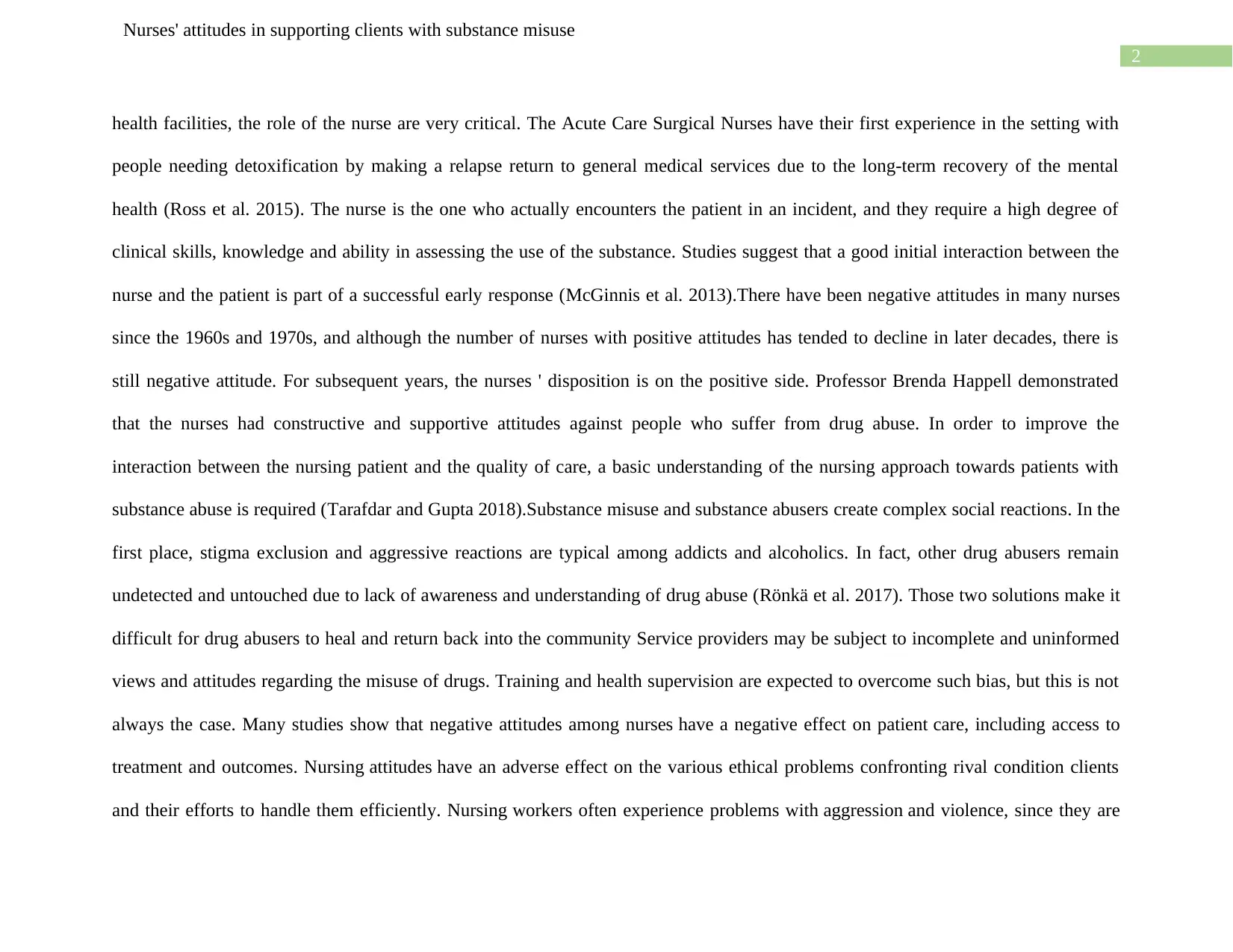
2
Nurses' attitudes in supporting clients with substance misuse
health facilities, the role of the nurse are very critical. The Acute Care Surgical Nurses have their first experience in the setting with
people needing detoxification by making a relapse return to general medical services due to the long-term recovery of the mental
health (Ross et al. 2015). The nurse is the one who actually encounters the patient in an incident, and they require a high degree of
clinical skills, knowledge and ability in assessing the use of the substance. Studies suggest that a good initial interaction between the
nurse and the patient is part of a successful early response (McGinnis et al. 2013).There have been negative attitudes in many nurses
since the 1960s and 1970s, and although the number of nurses with positive attitudes has tended to decline in later decades, there is
still negative attitude. For subsequent years, the nurses ' disposition is on the positive side. Professor Brenda Happell demonstrated
that the nurses had constructive and supportive attitudes against people who suffer from drug abuse. In order to improve the
interaction between the nursing patient and the quality of care, a basic understanding of the nursing approach towards patients with
substance abuse is required (Tarafdar and Gupta 2018).Substance misuse and substance abusers create complex social reactions. In the
first place, stigma exclusion and aggressive reactions are typical among addicts and alcoholics. In fact, other drug abusers remain
undetected and untouched due to lack of awareness and understanding of drug abuse (Rönkä et al. 2017). Those two solutions make it
difficult for drug abusers to heal and return back into the community Service providers may be subject to incomplete and uninformed
views and attitudes regarding the misuse of drugs. Training and health supervision are expected to overcome such bias, but this is not
always the case. Many studies show that negative attitudes among nurses have a negative effect on patient care, including access to
treatment and outcomes. Nursing attitudes have an adverse effect on the various ethical problems confronting rival condition clients
and their efforts to handle them efficiently. Nursing workers often experience problems with aggression and violence, since they are
Nurses' attitudes in supporting clients with substance misuse
health facilities, the role of the nurse are very critical. The Acute Care Surgical Nurses have their first experience in the setting with
people needing detoxification by making a relapse return to general medical services due to the long-term recovery of the mental
health (Ross et al. 2015). The nurse is the one who actually encounters the patient in an incident, and they require a high degree of
clinical skills, knowledge and ability in assessing the use of the substance. Studies suggest that a good initial interaction between the
nurse and the patient is part of a successful early response (McGinnis et al. 2013).There have been negative attitudes in many nurses
since the 1960s and 1970s, and although the number of nurses with positive attitudes has tended to decline in later decades, there is
still negative attitude. For subsequent years, the nurses ' disposition is on the positive side. Professor Brenda Happell demonstrated
that the nurses had constructive and supportive attitudes against people who suffer from drug abuse. In order to improve the
interaction between the nursing patient and the quality of care, a basic understanding of the nursing approach towards patients with
substance abuse is required (Tarafdar and Gupta 2018).Substance misuse and substance abusers create complex social reactions. In the
first place, stigma exclusion and aggressive reactions are typical among addicts and alcoholics. In fact, other drug abusers remain
undetected and untouched due to lack of awareness and understanding of drug abuse (Rönkä et al. 2017). Those two solutions make it
difficult for drug abusers to heal and return back into the community Service providers may be subject to incomplete and uninformed
views and attitudes regarding the misuse of drugs. Training and health supervision are expected to overcome such bias, but this is not
always the case. Many studies show that negative attitudes among nurses have a negative effect on patient care, including access to
treatment and outcomes. Nursing attitudes have an adverse effect on the various ethical problems confronting rival condition clients
and their efforts to handle them efficiently. Nursing workers often experience problems with aggression and violence, since they are
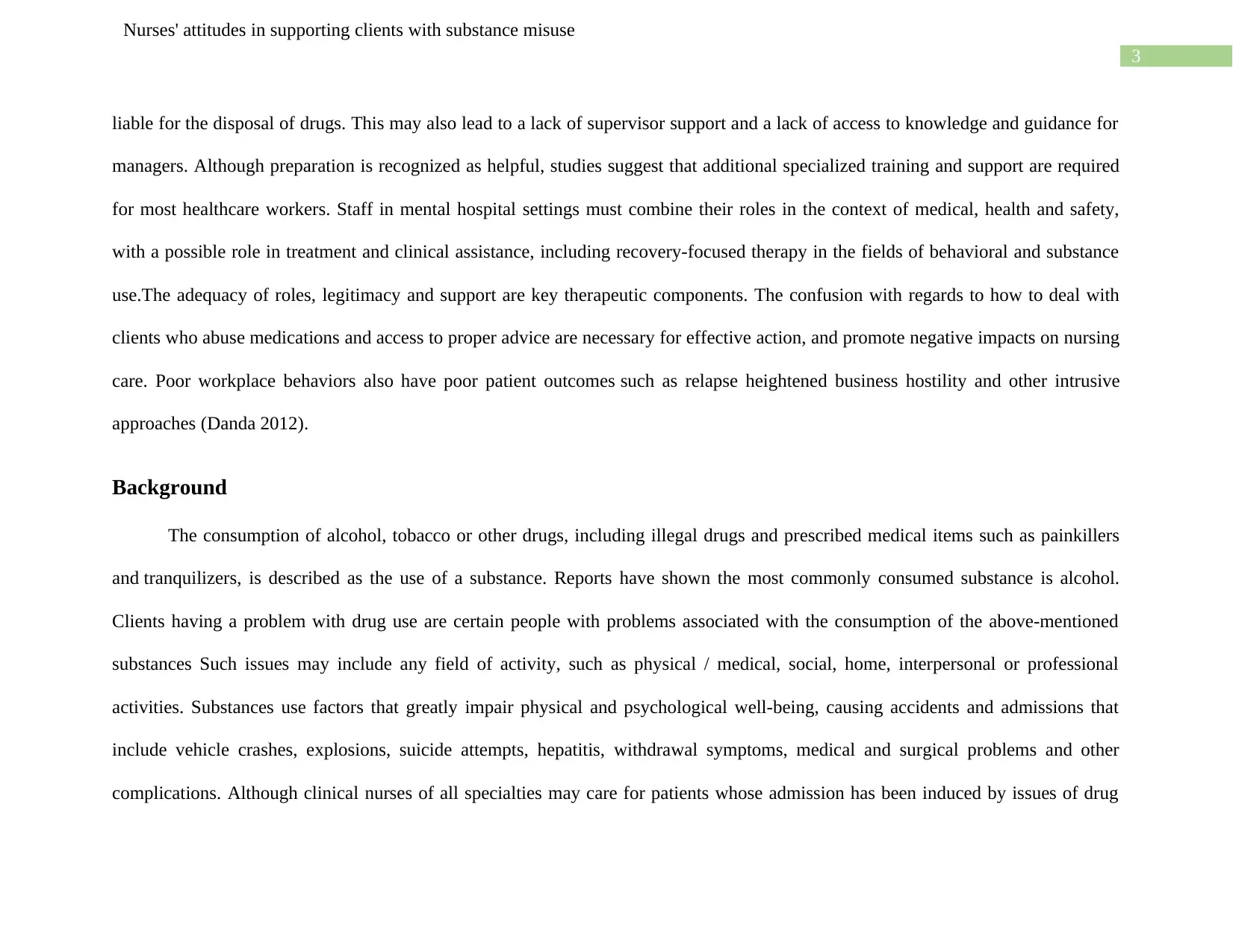
3
Nurses' attitudes in supporting clients with substance misuse
liable for the disposal of drugs. This may also lead to a lack of supervisor support and a lack of access to knowledge and guidance for
managers. Although preparation is recognized as helpful, studies suggest that additional specialized training and support are required
for most healthcare workers. Staff in mental hospital settings must combine their roles in the context of medical, health and safety,
with a possible role in treatment and clinical assistance, including recovery-focused therapy in the fields of behavioral and substance
use.The adequacy of roles, legitimacy and support are key therapeutic components. The confusion with regards to how to deal with
clients who abuse medications and access to proper advice are necessary for effective action, and promote negative impacts on nursing
care. Poor workplace behaviors also have poor patient outcomes such as relapse heightened business hostility and other intrusive
approaches (Danda 2012).
Background
The consumption of alcohol, tobacco or other drugs, including illegal drugs and prescribed medical items such as painkillers
and tranquilizers, is described as the use of a substance. Reports have shown the most commonly consumed substance is alcohol.
Clients having a problem with drug use are certain people with problems associated with the consumption of the above-mentioned
substances Such issues may include any field of activity, such as physical / medical, social, home, interpersonal or professional
activities. Substances use factors that greatly impair physical and psychological well-being, causing accidents and admissions that
include vehicle crashes, explosions, suicide attempts, hepatitis, withdrawal symptoms, medical and surgical problems and other
complications. Although clinical nurses of all specialties may care for patients whose admission has been induced by issues of drug
Nurses' attitudes in supporting clients with substance misuse
liable for the disposal of drugs. This may also lead to a lack of supervisor support and a lack of access to knowledge and guidance for
managers. Although preparation is recognized as helpful, studies suggest that additional specialized training and support are required
for most healthcare workers. Staff in mental hospital settings must combine their roles in the context of medical, health and safety,
with a possible role in treatment and clinical assistance, including recovery-focused therapy in the fields of behavioral and substance
use.The adequacy of roles, legitimacy and support are key therapeutic components. The confusion with regards to how to deal with
clients who abuse medications and access to proper advice are necessary for effective action, and promote negative impacts on nursing
care. Poor workplace behaviors also have poor patient outcomes such as relapse heightened business hostility and other intrusive
approaches (Danda 2012).
Background
The consumption of alcohol, tobacco or other drugs, including illegal drugs and prescribed medical items such as painkillers
and tranquilizers, is described as the use of a substance. Reports have shown the most commonly consumed substance is alcohol.
Clients having a problem with drug use are certain people with problems associated with the consumption of the above-mentioned
substances Such issues may include any field of activity, such as physical / medical, social, home, interpersonal or professional
activities. Substances use factors that greatly impair physical and psychological well-being, causing accidents and admissions that
include vehicle crashes, explosions, suicide attempts, hepatitis, withdrawal symptoms, medical and surgical problems and other
complications. Although clinical nurses of all specialties may care for patients whose admission has been induced by issues of drug
Secure Best Marks with AI Grader
Need help grading? Try our AI Grader for instant feedback on your assignments.
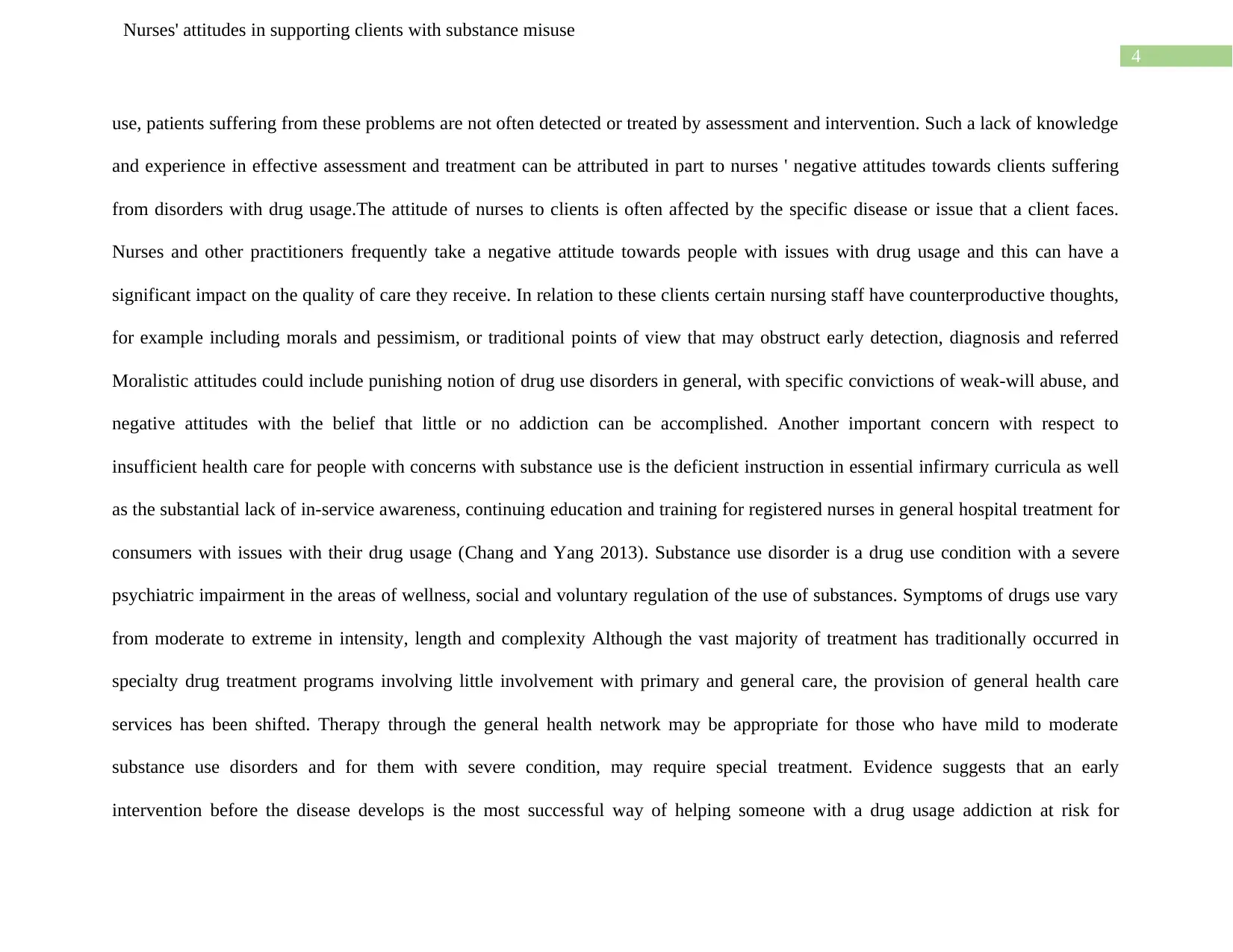
4
Nurses' attitudes in supporting clients with substance misuse
use, patients suffering from these problems are not often detected or treated by assessment and intervention. Such a lack of knowledge
and experience in effective assessment and treatment can be attributed in part to nurses ' negative attitudes towards clients suffering
from disorders with drug usage.The attitude of nurses to clients is often affected by the specific disease or issue that a client faces.
Nurses and other practitioners frequently take a negative attitude towards people with issues with drug usage and this can have a
significant impact on the quality of care they receive. In relation to these clients certain nursing staff have counterproductive thoughts,
for example including morals and pessimism, or traditional points of view that may obstruct early detection, diagnosis and referred
Moralistic attitudes could include punishing notion of drug use disorders in general, with specific convictions of weak-will abuse, and
negative attitudes with the belief that little or no addiction can be accomplished. Another important concern with respect to
insufficient health care for people with concerns with substance use is the deficient instruction in essential infirmary curricula as well
as the substantial lack of in-service awareness, continuing education and training for registered nurses in general hospital treatment for
consumers with issues with their drug usage (Chang and Yang 2013). Substance use disorder is a drug use condition with a severe
psychiatric impairment in the areas of wellness, social and voluntary regulation of the use of substances. Symptoms of drugs use vary
from moderate to extreme in intensity, length and complexity Although the vast majority of treatment has traditionally occurred in
specialty drug treatment programs involving little involvement with primary and general care, the provision of general health care
services has been shifted. Therapy through the general health network may be appropriate for those who have mild to moderate
substance use disorders and for them with severe condition, may require special treatment. Evidence suggests that an early
intervention before the disease develops is the most successful way of helping someone with a drug usage addiction at risk for
Nurses' attitudes in supporting clients with substance misuse
use, patients suffering from these problems are not often detected or treated by assessment and intervention. Such a lack of knowledge
and experience in effective assessment and treatment can be attributed in part to nurses ' negative attitudes towards clients suffering
from disorders with drug usage.The attitude of nurses to clients is often affected by the specific disease or issue that a client faces.
Nurses and other practitioners frequently take a negative attitude towards people with issues with drug usage and this can have a
significant impact on the quality of care they receive. In relation to these clients certain nursing staff have counterproductive thoughts,
for example including morals and pessimism, or traditional points of view that may obstruct early detection, diagnosis and referred
Moralistic attitudes could include punishing notion of drug use disorders in general, with specific convictions of weak-will abuse, and
negative attitudes with the belief that little or no addiction can be accomplished. Another important concern with respect to
insufficient health care for people with concerns with substance use is the deficient instruction in essential infirmary curricula as well
as the substantial lack of in-service awareness, continuing education and training for registered nurses in general hospital treatment for
consumers with issues with their drug usage (Chang and Yang 2013). Substance use disorder is a drug use condition with a severe
psychiatric impairment in the areas of wellness, social and voluntary regulation of the use of substances. Symptoms of drugs use vary
from moderate to extreme in intensity, length and complexity Although the vast majority of treatment has traditionally occurred in
specialty drug treatment programs involving little involvement with primary and general care, the provision of general health care
services has been shifted. Therapy through the general health network may be appropriate for those who have mild to moderate
substance use disorders and for them with severe condition, may require special treatment. Evidence suggests that an early
intervention before the disease develops is the most successful way of helping someone with a drug usage addiction at risk for
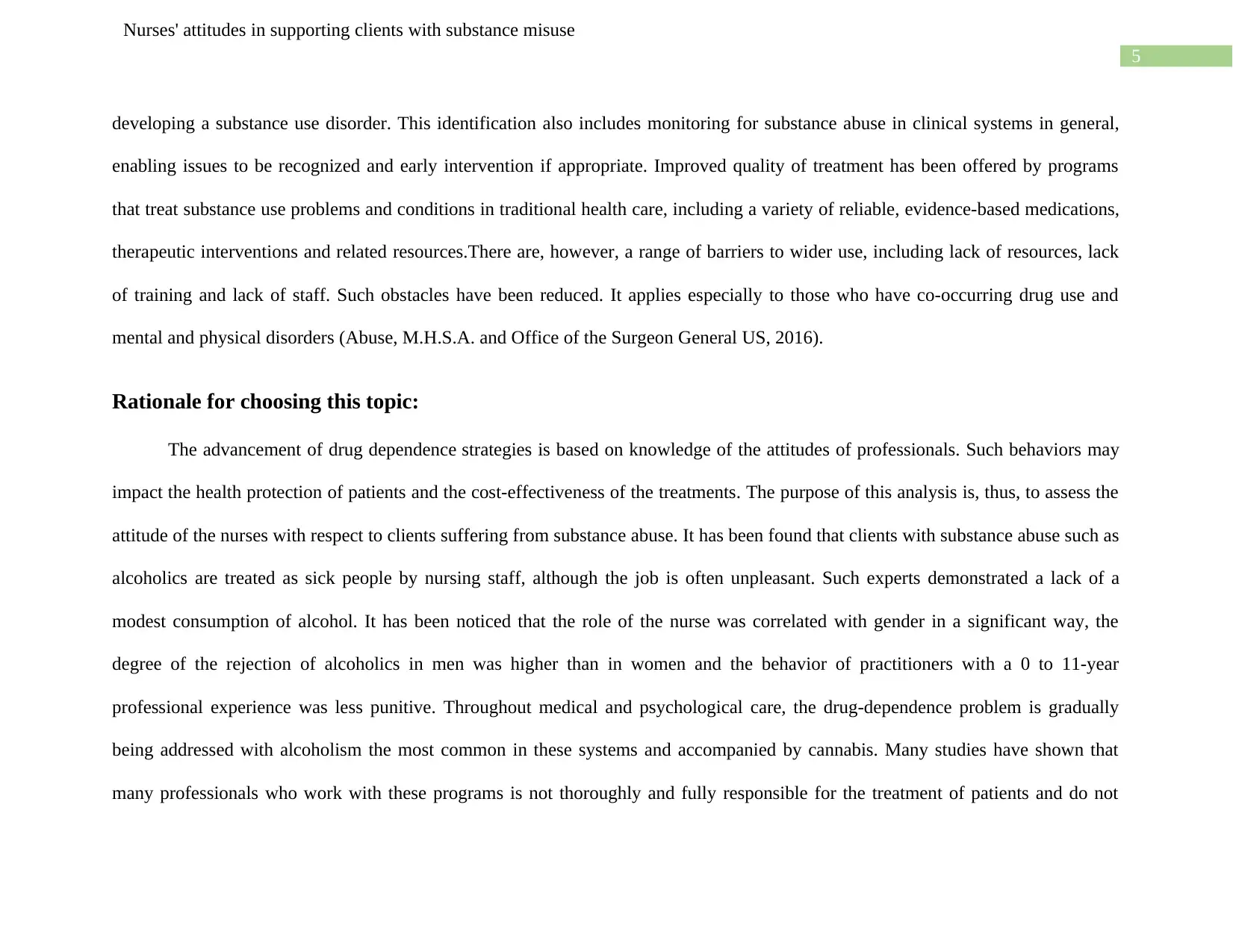
5
Nurses' attitudes in supporting clients with substance misuse
developing a substance use disorder. This identification also includes monitoring for substance abuse in clinical systems in general,
enabling issues to be recognized and early intervention if appropriate. Improved quality of treatment has been offered by programs
that treat substance use problems and conditions in traditional health care, including a variety of reliable, evidence-based medications,
therapeutic interventions and related resources.There are, however, a range of barriers to wider use, including lack of resources, lack
of training and lack of staff. Such obstacles have been reduced. It applies especially to those who have co-occurring drug use and
mental and physical disorders (Abuse, M.H.S.A. and Office of the Surgeon General US, 2016).
Rationale for choosing this topic:
The advancement of drug dependence strategies is based on knowledge of the attitudes of professionals. Such behaviors may
impact the health protection of patients and the cost-effectiveness of the treatments. The purpose of this analysis is, thus, to assess the
attitude of the nurses with respect to clients suffering from substance abuse. It has been found that clients with substance abuse such as
alcoholics are treated as sick people by nursing staff, although the job is often unpleasant. Such experts demonstrated a lack of a
modest consumption of alcohol. It has been noticed that the role of the nurse was correlated with gender in a significant way, the
degree of the rejection of alcoholics in men was higher than in women and the behavior of practitioners with a 0 to 11-year
professional experience was less punitive. Throughout medical and psychological care, the drug-dependence problem is gradually
being addressed with alcoholism the most common in these systems and accompanied by cannabis. Many studies have shown that
many professionals who work with these programs is not thoroughly and fully responsible for the treatment of patients and do not
Nurses' attitudes in supporting clients with substance misuse
developing a substance use disorder. This identification also includes monitoring for substance abuse in clinical systems in general,
enabling issues to be recognized and early intervention if appropriate. Improved quality of treatment has been offered by programs
that treat substance use problems and conditions in traditional health care, including a variety of reliable, evidence-based medications,
therapeutic interventions and related resources.There are, however, a range of barriers to wider use, including lack of resources, lack
of training and lack of staff. Such obstacles have been reduced. It applies especially to those who have co-occurring drug use and
mental and physical disorders (Abuse, M.H.S.A. and Office of the Surgeon General US, 2016).
Rationale for choosing this topic:
The advancement of drug dependence strategies is based on knowledge of the attitudes of professionals. Such behaviors may
impact the health protection of patients and the cost-effectiveness of the treatments. The purpose of this analysis is, thus, to assess the
attitude of the nurses with respect to clients suffering from substance abuse. It has been found that clients with substance abuse such as
alcoholics are treated as sick people by nursing staff, although the job is often unpleasant. Such experts demonstrated a lack of a
modest consumption of alcohol. It has been noticed that the role of the nurse was correlated with gender in a significant way, the
degree of the rejection of alcoholics in men was higher than in women and the behavior of practitioners with a 0 to 11-year
professional experience was less punitive. Throughout medical and psychological care, the drug-dependence problem is gradually
being addressed with alcoholism the most common in these systems and accompanied by cannabis. Many studies have shown that
many professionals who work with these programs is not thoroughly and fully responsible for the treatment of patients and do not
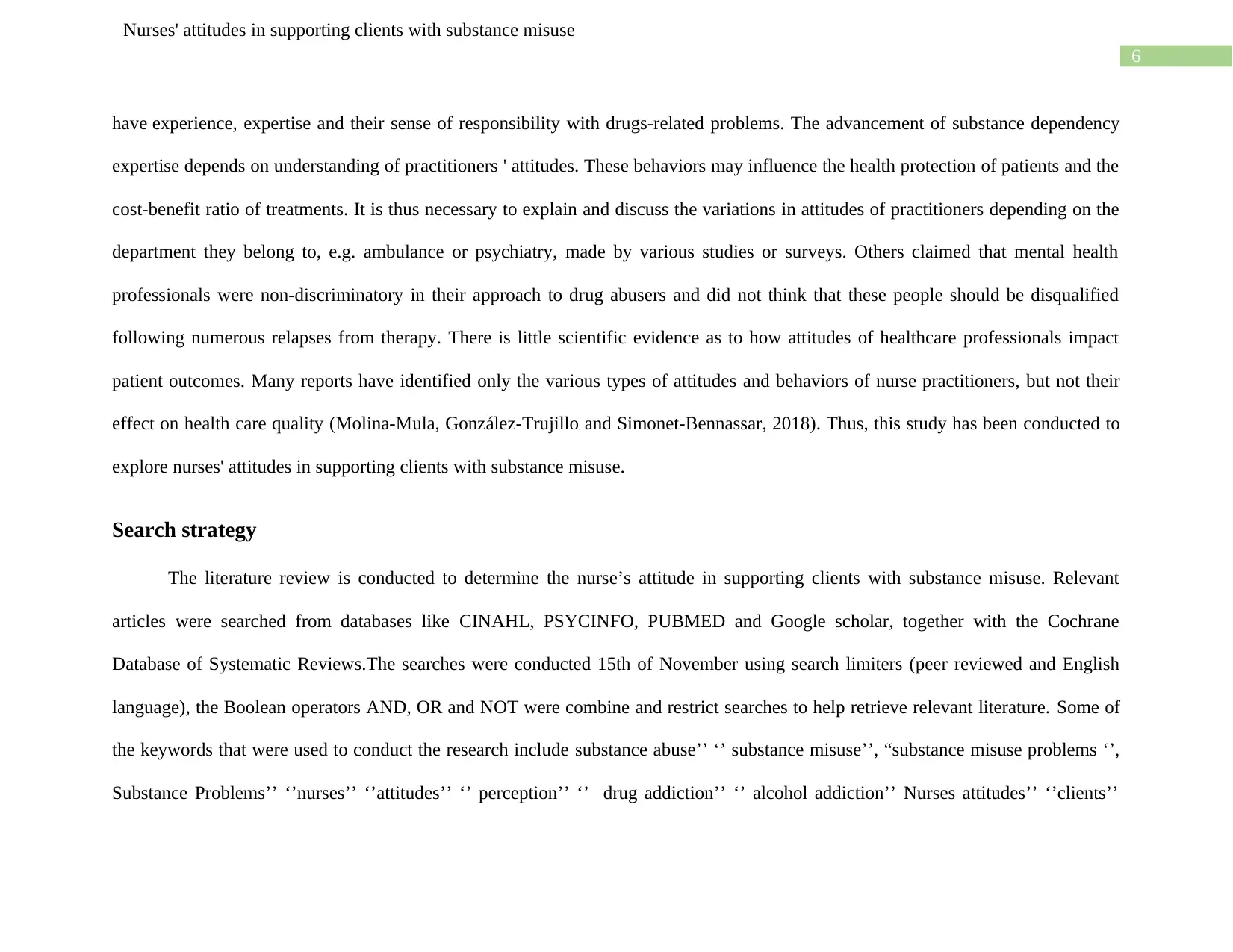
6
Nurses' attitudes in supporting clients with substance misuse
have experience, expertise and their sense of responsibility with drugs-related problems. The advancement of substance dependency
expertise depends on understanding of practitioners ' attitudes. These behaviors may influence the health protection of patients and the
cost-benefit ratio of treatments. It is thus necessary to explain and discuss the variations in attitudes of practitioners depending on the
department they belong to, e.g. ambulance or psychiatry, made by various studies or surveys. Others claimed that mental health
professionals were non-discriminatory in their approach to drug abusers and did not think that these people should be disqualified
following numerous relapses from therapy. There is little scientific evidence as to how attitudes of healthcare professionals impact
patient outcomes. Many reports have identified only the various types of attitudes and behaviors of nurse practitioners, but not their
effect on health care quality (Molina-Mula, González-Trujillo and Simonet-Bennassar, 2018). Thus, this study has been conducted to
explore nurses' attitudes in supporting clients with substance misuse.
Search strategy
The literature review is conducted to determine the nurse’s attitude in supporting clients with substance misuse. Relevant
articles were searched from databases like CINAHL, PSYCINFO, PUBMED and Google scholar, together with the Cochrane
Database of Systematic Reviews.The searches were conducted 15th of November using search limiters (peer reviewed and English
language), the Boolean operators AND, OR and NOT were combine and restrict searches to help retrieve relevant literature. Some of
the keywords that were used to conduct the research include substance abuse’’ ‘’ substance misuse’’, “substance misuse problems ‘’,
Substance Problems’’ ‘’nurses’’ ‘’attitudes’’ ‘’ perception’’ ‘’ drug addiction’’ ‘’ alcohol addiction’’ Nurses attitudes’’ ‘’clients’’
Nurses' attitudes in supporting clients with substance misuse
have experience, expertise and their sense of responsibility with drugs-related problems. The advancement of substance dependency
expertise depends on understanding of practitioners ' attitudes. These behaviors may influence the health protection of patients and the
cost-benefit ratio of treatments. It is thus necessary to explain and discuss the variations in attitudes of practitioners depending on the
department they belong to, e.g. ambulance or psychiatry, made by various studies or surveys. Others claimed that mental health
professionals were non-discriminatory in their approach to drug abusers and did not think that these people should be disqualified
following numerous relapses from therapy. There is little scientific evidence as to how attitudes of healthcare professionals impact
patient outcomes. Many reports have identified only the various types of attitudes and behaviors of nurse practitioners, but not their
effect on health care quality (Molina-Mula, González-Trujillo and Simonet-Bennassar, 2018). Thus, this study has been conducted to
explore nurses' attitudes in supporting clients with substance misuse.
Search strategy
The literature review is conducted to determine the nurse’s attitude in supporting clients with substance misuse. Relevant
articles were searched from databases like CINAHL, PSYCINFO, PUBMED and Google scholar, together with the Cochrane
Database of Systematic Reviews.The searches were conducted 15th of November using search limiters (peer reviewed and English
language), the Boolean operators AND, OR and NOT were combine and restrict searches to help retrieve relevant literature. Some of
the keywords that were used to conduct the research include substance abuse’’ ‘’ substance misuse’’, “substance misuse problems ‘’,
Substance Problems’’ ‘’nurses’’ ‘’attitudes’’ ‘’ perception’’ ‘’ drug addiction’’ ‘’ alcohol addiction’’ Nurses attitudes’’ ‘’clients’’
Paraphrase This Document
Need a fresh take? Get an instant paraphrase of this document with our AI Paraphraser
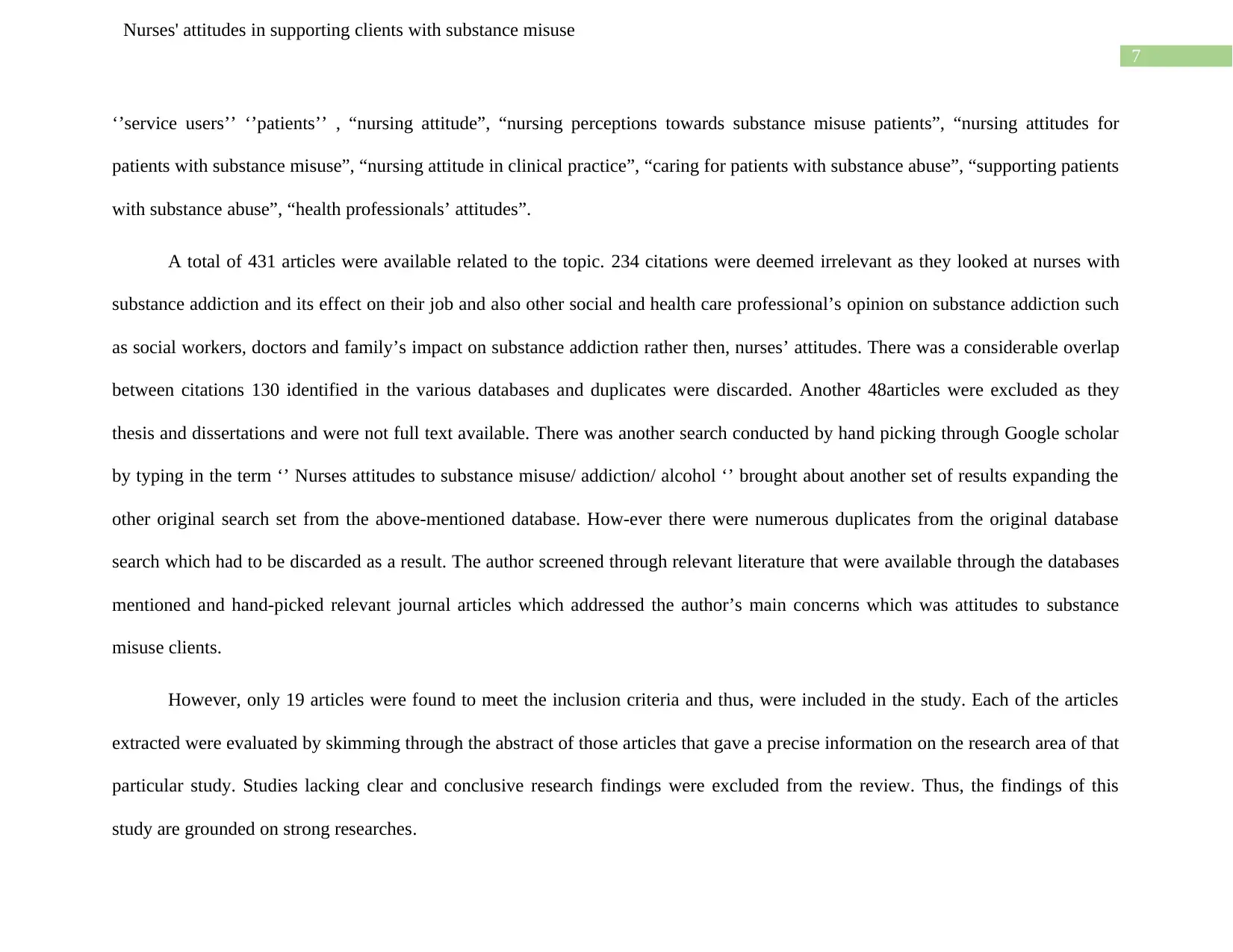
7
Nurses' attitudes in supporting clients with substance misuse
‘’service users’’ ‘’patients’’ , “nursing attitude”, “nursing perceptions towards substance misuse patients”, “nursing attitudes for
patients with substance misuse”, “nursing attitude in clinical practice”, “caring for patients with substance abuse”, “supporting patients
with substance abuse”, “health professionals’ attitudes”.
A total of 431 articles were available related to the topic. 234 citations were deemed irrelevant as they looked at nurses with
substance addiction and its effect on their job and also other social and health care professional’s opinion on substance addiction such
as social workers, doctors and family’s impact on substance addiction rather then, nurses’ attitudes. There was a considerable overlap
between citations 130 identified in the various databases and duplicates were discarded. Another 48articles were excluded as they
thesis and dissertations and were not full text available. There was another search conducted by hand picking through Google scholar
by typing in the term ‘’ Nurses attitudes to substance misuse/ addiction/ alcohol ‘’ brought about another set of results expanding the
other original search set from the above-mentioned database. How-ever there were numerous duplicates from the original database
search which had to be discarded as a result. The author screened through relevant literature that were available through the databases
mentioned and hand-picked relevant journal articles which addressed the author’s main concerns which was attitudes to substance
misuse clients.
However, only 19 articles were found to meet the inclusion criteria and thus, were included in the study. Each of the articles
extracted were evaluated by skimming through the abstract of those articles that gave a precise information on the research area of that
particular study. Studies lacking clear and conclusive research findings were excluded from the review. Thus, the findings of this
study are grounded on strong researches.
Nurses' attitudes in supporting clients with substance misuse
‘’service users’’ ‘’patients’’ , “nursing attitude”, “nursing perceptions towards substance misuse patients”, “nursing attitudes for
patients with substance misuse”, “nursing attitude in clinical practice”, “caring for patients with substance abuse”, “supporting patients
with substance abuse”, “health professionals’ attitudes”.
A total of 431 articles were available related to the topic. 234 citations were deemed irrelevant as they looked at nurses with
substance addiction and its effect on their job and also other social and health care professional’s opinion on substance addiction such
as social workers, doctors and family’s impact on substance addiction rather then, nurses’ attitudes. There was a considerable overlap
between citations 130 identified in the various databases and duplicates were discarded. Another 48articles were excluded as they
thesis and dissertations and were not full text available. There was another search conducted by hand picking through Google scholar
by typing in the term ‘’ Nurses attitudes to substance misuse/ addiction/ alcohol ‘’ brought about another set of results expanding the
other original search set from the above-mentioned database. How-ever there were numerous duplicates from the original database
search which had to be discarded as a result. The author screened through relevant literature that were available through the databases
mentioned and hand-picked relevant journal articles which addressed the author’s main concerns which was attitudes to substance
misuse clients.
However, only 19 articles were found to meet the inclusion criteria and thus, were included in the study. Each of the articles
extracted were evaluated by skimming through the abstract of those articles that gave a precise information on the research area of that
particular study. Studies lacking clear and conclusive research findings were excluded from the review. Thus, the findings of this
study are grounded on strong researches.
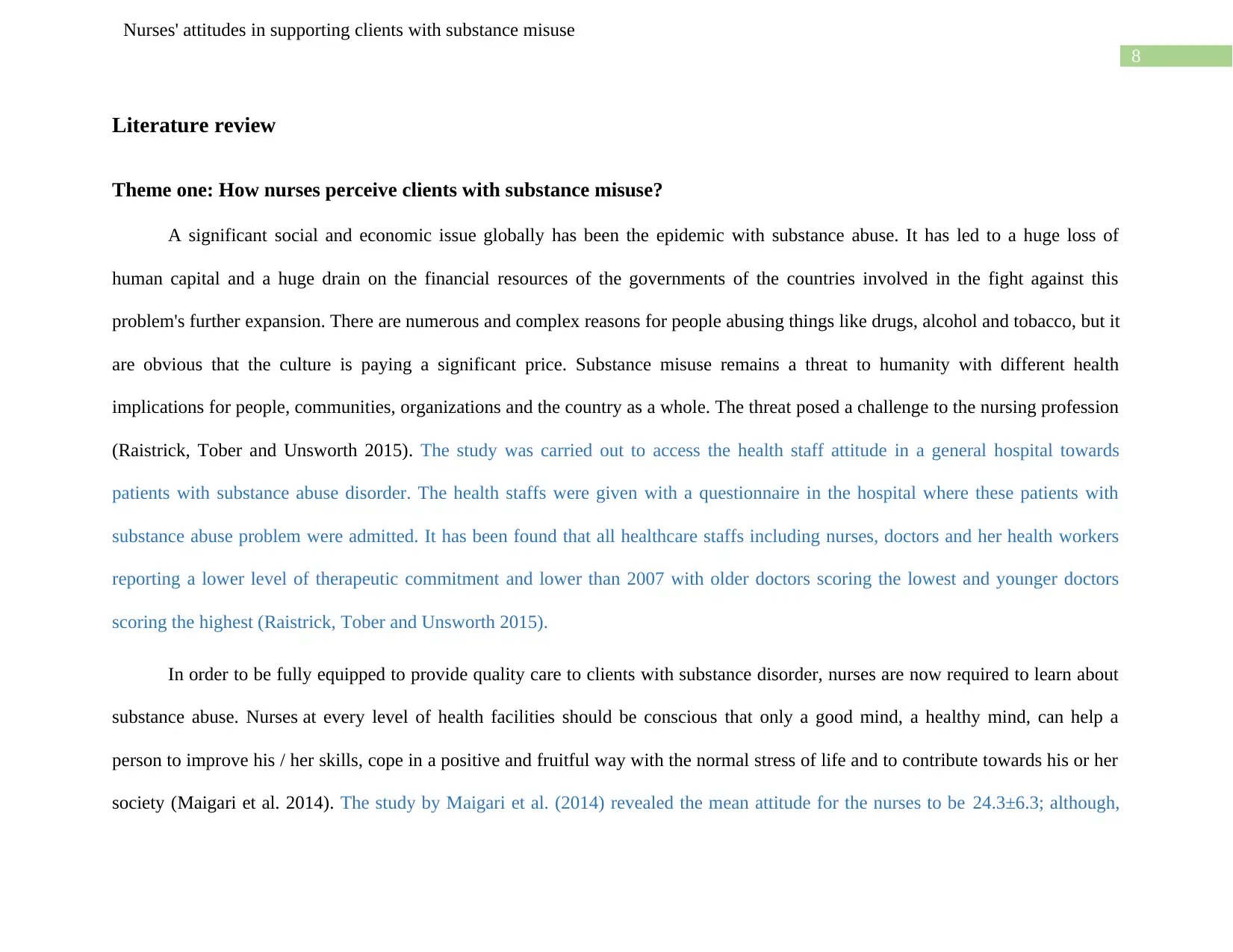
8
Nurses' attitudes in supporting clients with substance misuse
Literature review
Theme one: How nurses perceive clients with substance misuse?
A significant social and economic issue globally has been the epidemic with substance abuse. It has led to a huge loss of
human capital and a huge drain on the financial resources of the governments of the countries involved in the fight against this
problem's further expansion. There are numerous and complex reasons for people abusing things like drugs, alcohol and tobacco, but it
are obvious that the culture is paying a significant price. Substance misuse remains a threat to humanity with different health
implications for people, communities, organizations and the country as a whole. The threat posed a challenge to the nursing profession
(Raistrick, Tober and Unsworth 2015). The study was carried out to access the health staff attitude in a general hospital towards
patients with substance abuse disorder. The health staffs were given with a questionnaire in the hospital where these patients with
substance abuse problem were admitted. It has been found that all healthcare staffs including nurses, doctors and her health workers
reporting a lower level of therapeutic commitment and lower than 2007 with older doctors scoring the lowest and younger doctors
scoring the highest (Raistrick, Tober and Unsworth 2015).
In order to be fully equipped to provide quality care to clients with substance disorder, nurses are now required to learn about
substance abuse. Nurses at every level of health facilities should be conscious that only a good mind, a healthy mind, can help a
person to improve his / her skills, cope in a positive and fruitful way with the normal stress of life and to contribute towards his or her
society (Maigari et al. 2014). The study by Maigari et al. (2014) revealed the mean attitude for the nurses to be 24.3±6.3; although,
Nurses' attitudes in supporting clients with substance misuse
Literature review
Theme one: How nurses perceive clients with substance misuse?
A significant social and economic issue globally has been the epidemic with substance abuse. It has led to a huge loss of
human capital and a huge drain on the financial resources of the governments of the countries involved in the fight against this
problem's further expansion. There are numerous and complex reasons for people abusing things like drugs, alcohol and tobacco, but it
are obvious that the culture is paying a significant price. Substance misuse remains a threat to humanity with different health
implications for people, communities, organizations and the country as a whole. The threat posed a challenge to the nursing profession
(Raistrick, Tober and Unsworth 2015). The study was carried out to access the health staff attitude in a general hospital towards
patients with substance abuse disorder. The health staffs were given with a questionnaire in the hospital where these patients with
substance abuse problem were admitted. It has been found that all healthcare staffs including nurses, doctors and her health workers
reporting a lower level of therapeutic commitment and lower than 2007 with older doctors scoring the lowest and younger doctors
scoring the highest (Raistrick, Tober and Unsworth 2015).
In order to be fully equipped to provide quality care to clients with substance disorder, nurses are now required to learn about
substance abuse. Nurses at every level of health facilities should be conscious that only a good mind, a healthy mind, can help a
person to improve his / her skills, cope in a positive and fruitful way with the normal stress of life and to contribute towards his or her
society (Maigari et al. 2014). The study by Maigari et al. (2014) revealed the mean attitude for the nurses to be 24.3±6.3; although,
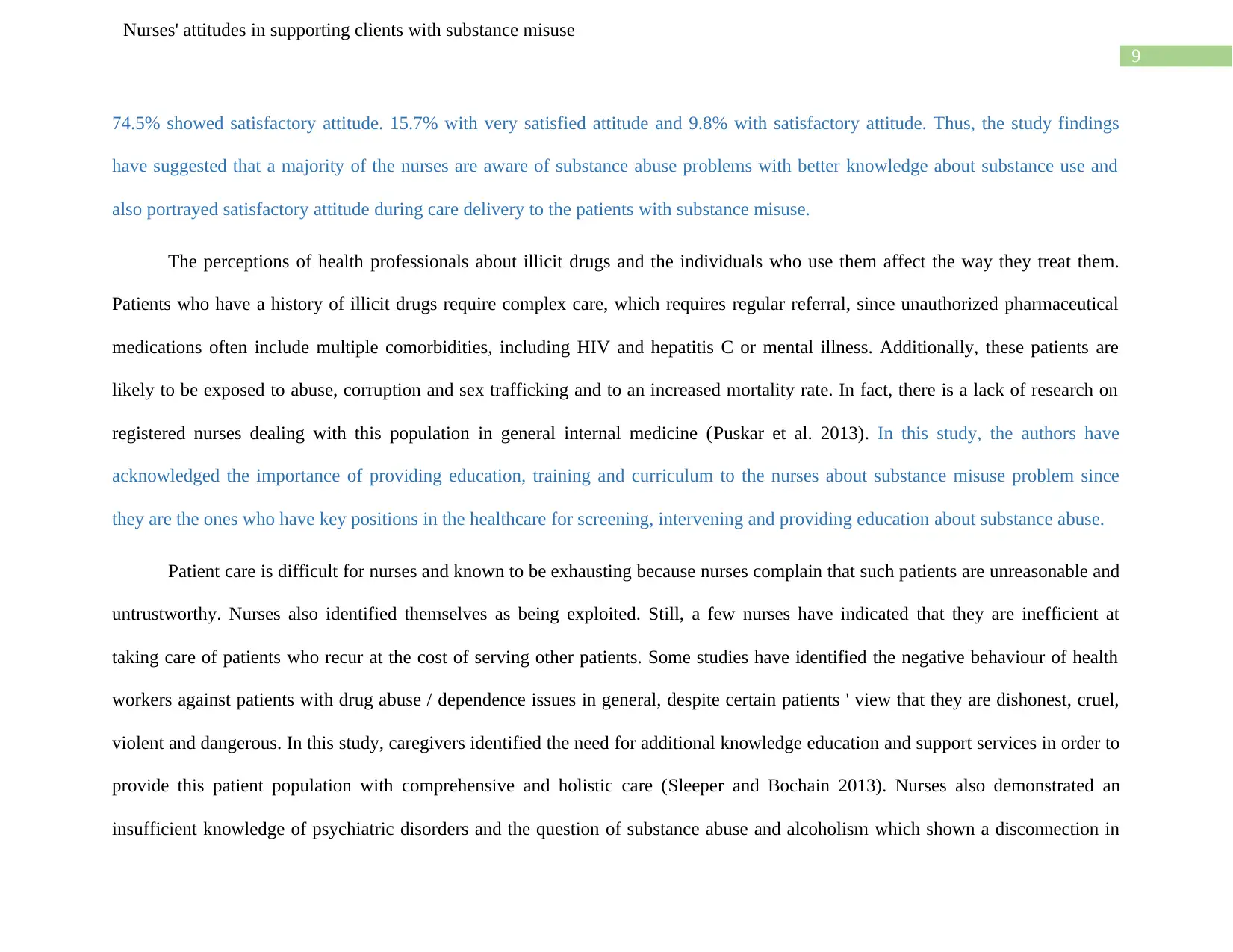
9
Nurses' attitudes in supporting clients with substance misuse
74.5% showed satisfactory attitude. 15.7% with very satisfied attitude and 9.8% with satisfactory attitude. Thus, the study findings
have suggested that a majority of the nurses are aware of substance abuse problems with better knowledge about substance use and
also portrayed satisfactory attitude during care delivery to the patients with substance misuse.
The perceptions of health professionals about illicit drugs and the individuals who use them affect the way they treat them.
Patients who have a history of illicit drugs require complex care, which requires regular referral, since unauthorized pharmaceutical
medications often include multiple comorbidities, including HIV and hepatitis C or mental illness. Additionally, these patients are
likely to be exposed to abuse, corruption and sex trafficking and to an increased mortality rate. In fact, there is a lack of research on
registered nurses dealing with this population in general internal medicine (Puskar et al. 2013). In this study, the authors have
acknowledged the importance of providing education, training and curriculum to the nurses about substance misuse problem since
they are the ones who have key positions in the healthcare for screening, intervening and providing education about substance abuse.
Patient care is difficult for nurses and known to be exhausting because nurses complain that such patients are unreasonable and
untrustworthy. Nurses also identified themselves as being exploited. Still, a few nurses have indicated that they are inefficient at
taking care of patients who recur at the cost of serving other patients. Some studies have identified the negative behaviour of health
workers against patients with drug abuse / dependence issues in general, despite certain patients ' view that they are dishonest, cruel,
violent and dangerous. In this study, caregivers identified the need for additional knowledge education and support services in order to
provide this patient population with comprehensive and holistic care (Sleeper and Bochain 2013). Nurses also demonstrated an
insufficient knowledge of psychiatric disorders and the question of substance abuse and alcoholism which shown a disconnection in
Nurses' attitudes in supporting clients with substance misuse
74.5% showed satisfactory attitude. 15.7% with very satisfied attitude and 9.8% with satisfactory attitude. Thus, the study findings
have suggested that a majority of the nurses are aware of substance abuse problems with better knowledge about substance use and
also portrayed satisfactory attitude during care delivery to the patients with substance misuse.
The perceptions of health professionals about illicit drugs and the individuals who use them affect the way they treat them.
Patients who have a history of illicit drugs require complex care, which requires regular referral, since unauthorized pharmaceutical
medications often include multiple comorbidities, including HIV and hepatitis C or mental illness. Additionally, these patients are
likely to be exposed to abuse, corruption and sex trafficking and to an increased mortality rate. In fact, there is a lack of research on
registered nurses dealing with this population in general internal medicine (Puskar et al. 2013). In this study, the authors have
acknowledged the importance of providing education, training and curriculum to the nurses about substance misuse problem since
they are the ones who have key positions in the healthcare for screening, intervening and providing education about substance abuse.
Patient care is difficult for nurses and known to be exhausting because nurses complain that such patients are unreasonable and
untrustworthy. Nurses also identified themselves as being exploited. Still, a few nurses have indicated that they are inefficient at
taking care of patients who recur at the cost of serving other patients. Some studies have identified the negative behaviour of health
workers against patients with drug abuse / dependence issues in general, despite certain patients ' view that they are dishonest, cruel,
violent and dangerous. In this study, caregivers identified the need for additional knowledge education and support services in order to
provide this patient population with comprehensive and holistic care (Sleeper and Bochain 2013). Nurses also demonstrated an
insufficient knowledge of psychiatric disorders and the question of substance abuse and alcoholism which shown a disconnection in
Secure Best Marks with AI Grader
Need help grading? Try our AI Grader for instant feedback on your assignments.
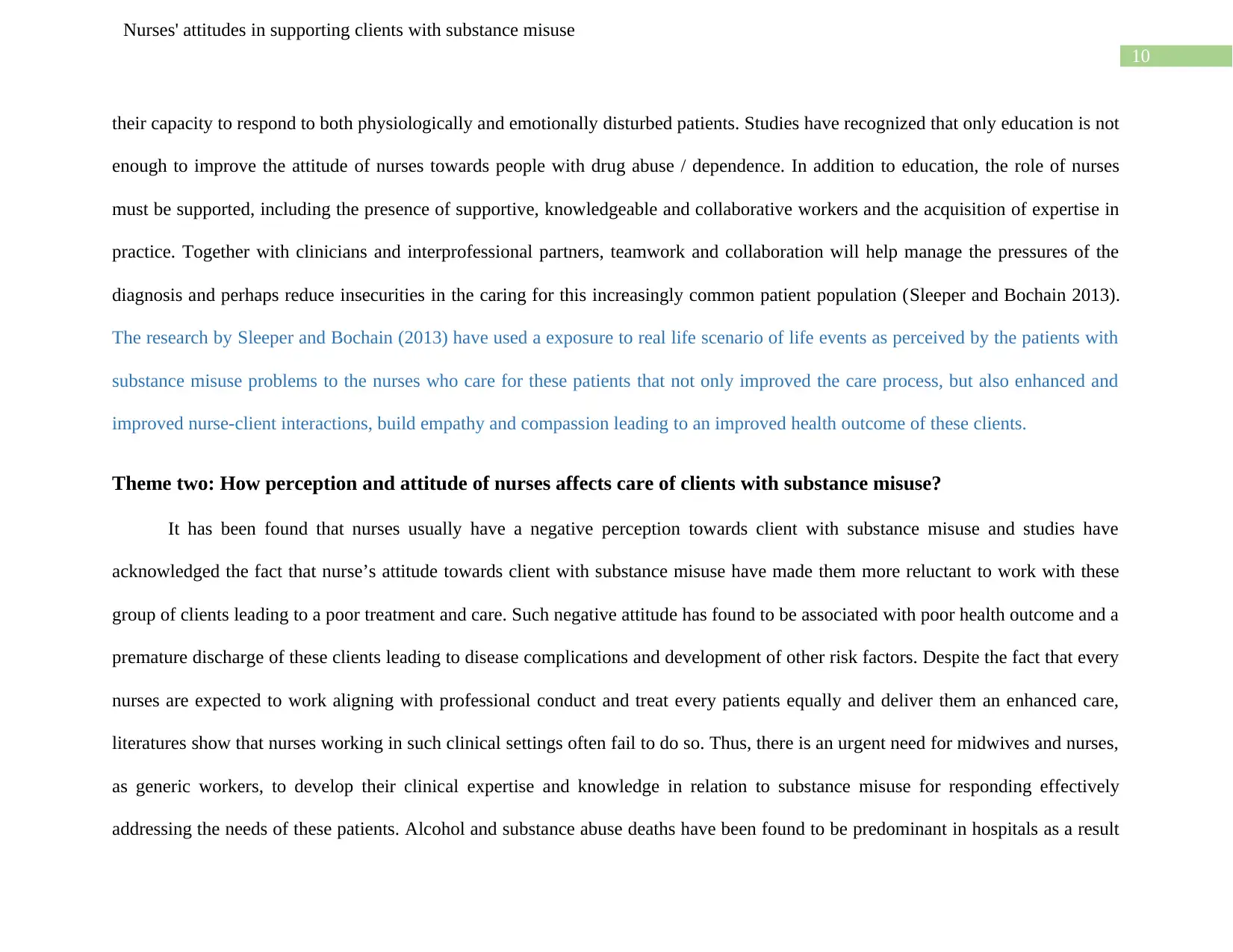
10
Nurses' attitudes in supporting clients with substance misuse
their capacity to respond to both physiologically and emotionally disturbed patients. Studies have recognized that only education is not
enough to improve the attitude of nurses towards people with drug abuse / dependence. In addition to education, the role of nurses
must be supported, including the presence of supportive, knowledgeable and collaborative workers and the acquisition of expertise in
practice. Together with clinicians and interprofessional partners, teamwork and collaboration will help manage the pressures of the
diagnosis and perhaps reduce insecurities in the caring for this increasingly common patient population (Sleeper and Bochain 2013).
The research by Sleeper and Bochain (2013) have used a exposure to real life scenario of life events as perceived by the patients with
substance misuse problems to the nurses who care for these patients that not only improved the care process, but also enhanced and
improved nurse-client interactions, build empathy and compassion leading to an improved health outcome of these clients.
Theme two: How perception and attitude of nurses affects care of clients with substance misuse?
It has been found that nurses usually have a negative perception towards client with substance misuse and studies have
acknowledged the fact that nurse’s attitude towards client with substance misuse have made them more reluctant to work with these
group of clients leading to a poor treatment and care. Such negative attitude has found to be associated with poor health outcome and a
premature discharge of these clients leading to disease complications and development of other risk factors. Despite the fact that every
nurses are expected to work aligning with professional conduct and treat every patients equally and deliver them an enhanced care,
literatures show that nurses working in such clinical settings often fail to do so. Thus, there is an urgent need for midwives and nurses,
as generic workers, to develop their clinical expertise and knowledge in relation to substance misuse for responding effectively
addressing the needs of these patients. Alcohol and substance abuse deaths have been found to be predominant in hospitals as a result
Nurses' attitudes in supporting clients with substance misuse
their capacity to respond to both physiologically and emotionally disturbed patients. Studies have recognized that only education is not
enough to improve the attitude of nurses towards people with drug abuse / dependence. In addition to education, the role of nurses
must be supported, including the presence of supportive, knowledgeable and collaborative workers and the acquisition of expertise in
practice. Together with clinicians and interprofessional partners, teamwork and collaboration will help manage the pressures of the
diagnosis and perhaps reduce insecurities in the caring for this increasingly common patient population (Sleeper and Bochain 2013).
The research by Sleeper and Bochain (2013) have used a exposure to real life scenario of life events as perceived by the patients with
substance misuse problems to the nurses who care for these patients that not only improved the care process, but also enhanced and
improved nurse-client interactions, build empathy and compassion leading to an improved health outcome of these clients.
Theme two: How perception and attitude of nurses affects care of clients with substance misuse?
It has been found that nurses usually have a negative perception towards client with substance misuse and studies have
acknowledged the fact that nurse’s attitude towards client with substance misuse have made them more reluctant to work with these
group of clients leading to a poor treatment and care. Such negative attitude has found to be associated with poor health outcome and a
premature discharge of these clients leading to disease complications and development of other risk factors. Despite the fact that every
nurses are expected to work aligning with professional conduct and treat every patients equally and deliver them an enhanced care,
literatures show that nurses working in such clinical settings often fail to do so. Thus, there is an urgent need for midwives and nurses,
as generic workers, to develop their clinical expertise and knowledge in relation to substance misuse for responding effectively
addressing the needs of these patients. Alcohol and substance abuse deaths have been found to be predominant in hospitals as a result
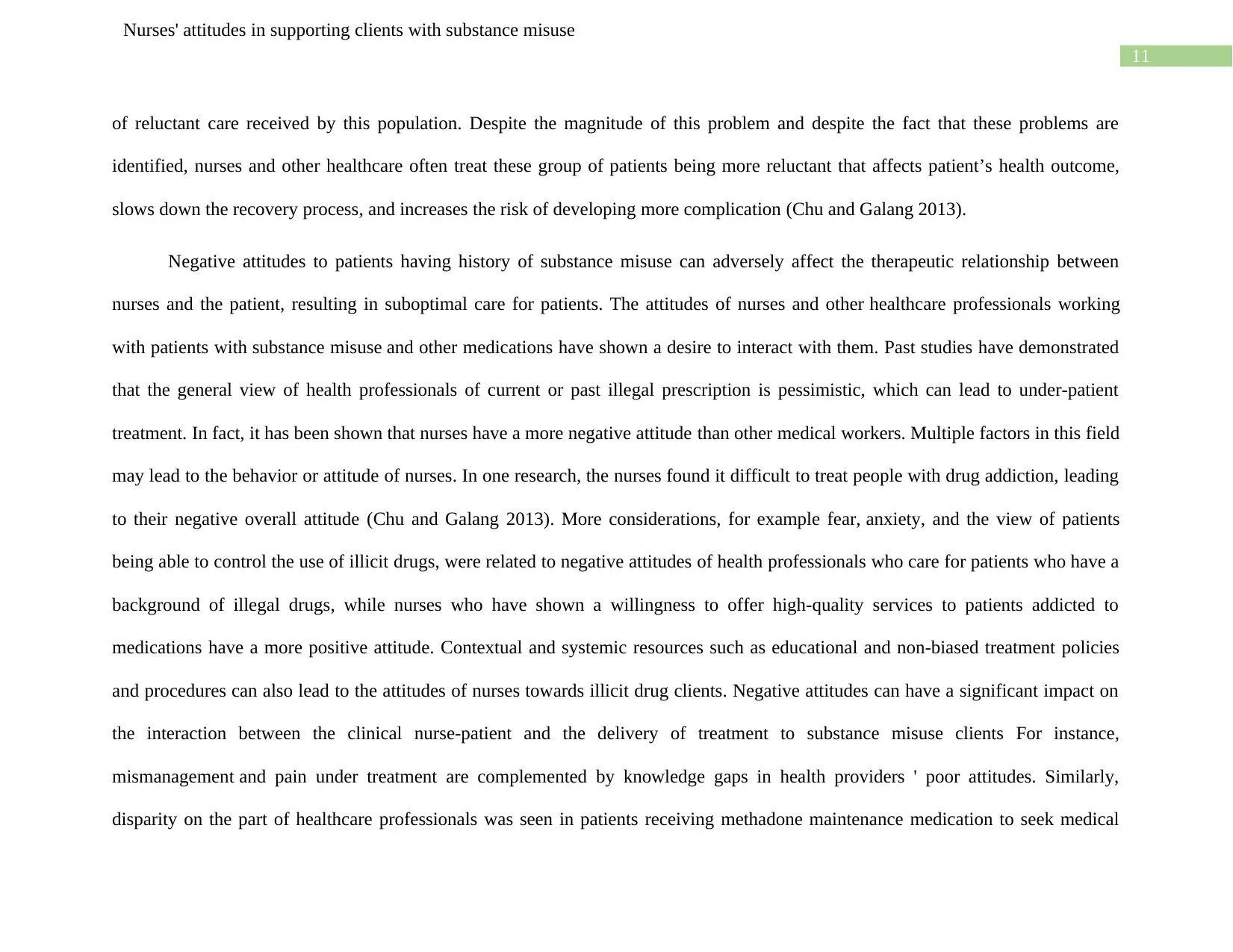
11
Nurses' attitudes in supporting clients with substance misuse
of reluctant care received by this population. Despite the magnitude of this problem and despite the fact that these problems are
identified, nurses and other healthcare often treat these group of patients being more reluctant that affects patient’s health outcome,
slows down the recovery process, and increases the risk of developing more complication (Chu and Galang 2013).
Negative attitudes to patients having history of substance misuse can adversely affect the therapeutic relationship between
nurses and the patient, resulting in suboptimal care for patients. The attitudes of nurses and other healthcare professionals working
with patients with substance misuse and other medications have shown a desire to interact with them. Past studies have demonstrated
that the general view of health professionals of current or past illegal prescription is pessimistic, which can lead to under-patient
treatment. In fact, it has been shown that nurses have a more negative attitude than other medical workers. Multiple factors in this field
may lead to the behavior or attitude of nurses. In one research, the nurses found it difficult to treat people with drug addiction, leading
to their negative overall attitude (Chu and Galang 2013). More considerations, for example fear, anxiety, and the view of patients
being able to control the use of illicit drugs, were related to negative attitudes of health professionals who care for patients who have a
background of illegal drugs, while nurses who have shown a willingness to offer high-quality services to patients addicted to
medications have a more positive attitude. Contextual and systemic resources such as educational and non-biased treatment policies
and procedures can also lead to the attitudes of nurses towards illicit drug clients. Negative attitudes can have a significant impact on
the interaction between the clinical nurse-patient and the delivery of treatment to substance misuse clients For instance,
mismanagement and pain under treatment are complemented by knowledge gaps in health providers ' poor attitudes. Similarly,
disparity on the part of healthcare professionals was seen in patients receiving methadone maintenance medication to seek medical
Nurses' attitudes in supporting clients with substance misuse
of reluctant care received by this population. Despite the magnitude of this problem and despite the fact that these problems are
identified, nurses and other healthcare often treat these group of patients being more reluctant that affects patient’s health outcome,
slows down the recovery process, and increases the risk of developing more complication (Chu and Galang 2013).
Negative attitudes to patients having history of substance misuse can adversely affect the therapeutic relationship between
nurses and the patient, resulting in suboptimal care for patients. The attitudes of nurses and other healthcare professionals working
with patients with substance misuse and other medications have shown a desire to interact with them. Past studies have demonstrated
that the general view of health professionals of current or past illegal prescription is pessimistic, which can lead to under-patient
treatment. In fact, it has been shown that nurses have a more negative attitude than other medical workers. Multiple factors in this field
may lead to the behavior or attitude of nurses. In one research, the nurses found it difficult to treat people with drug addiction, leading
to their negative overall attitude (Chu and Galang 2013). More considerations, for example fear, anxiety, and the view of patients
being able to control the use of illicit drugs, were related to negative attitudes of health professionals who care for patients who have a
background of illegal drugs, while nurses who have shown a willingness to offer high-quality services to patients addicted to
medications have a more positive attitude. Contextual and systemic resources such as educational and non-biased treatment policies
and procedures can also lead to the attitudes of nurses towards illicit drug clients. Negative attitudes can have a significant impact on
the interaction between the clinical nurse-patient and the delivery of treatment to substance misuse clients For instance,
mismanagement and pain under treatment are complemented by knowledge gaps in health providers ' poor attitudes. Similarly,
disparity on the part of healthcare professionals was seen in patients receiving methadone maintenance medication to seek medical
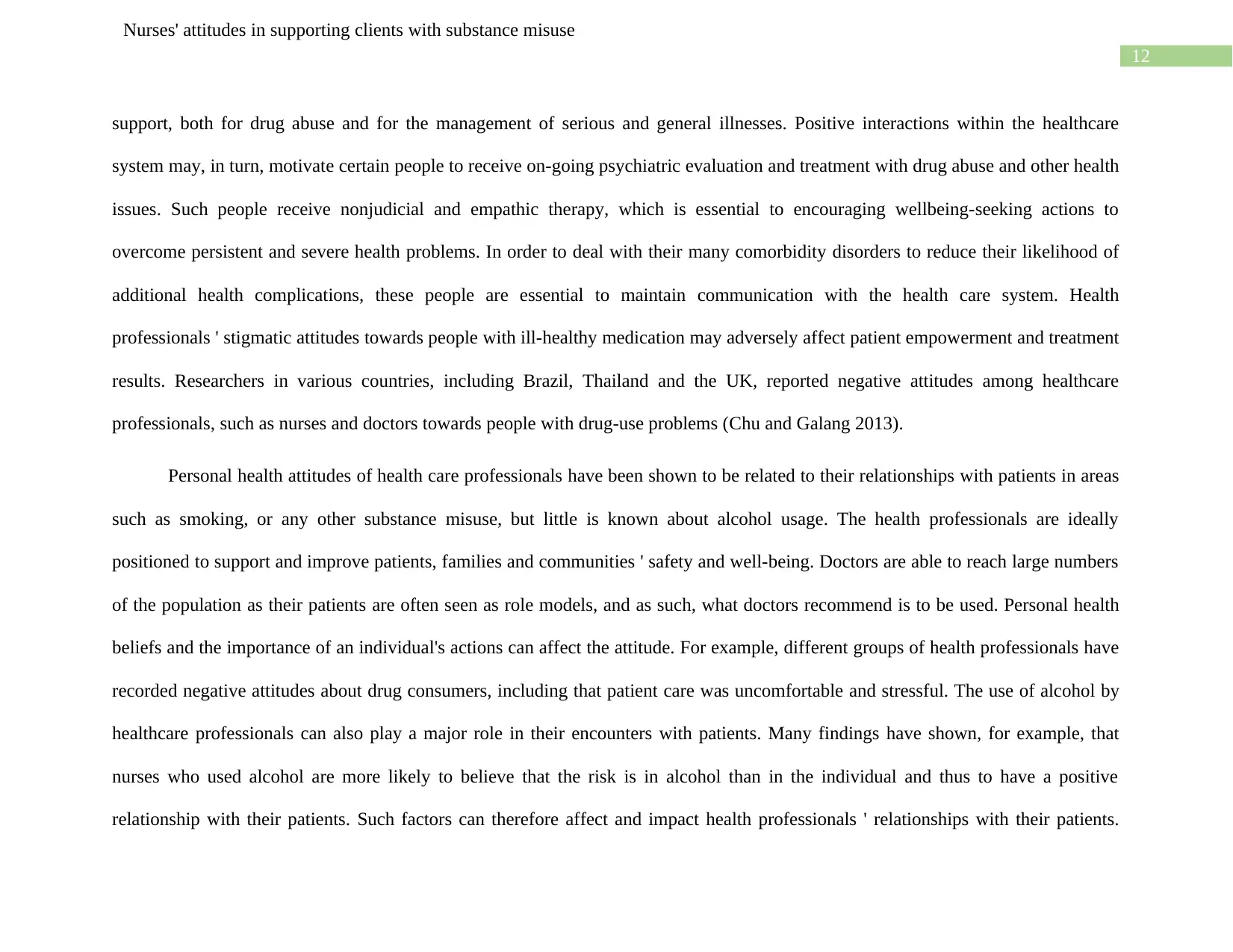
12
Nurses' attitudes in supporting clients with substance misuse
support, both for drug abuse and for the management of serious and general illnesses. Positive interactions within the healthcare
system may, in turn, motivate certain people to receive on-going psychiatric evaluation and treatment with drug abuse and other health
issues. Such people receive nonjudicial and empathic therapy, which is essential to encouraging wellbeing-seeking actions to
overcome persistent and severe health problems. In order to deal with their many comorbidity disorders to reduce their likelihood of
additional health complications, these people are essential to maintain communication with the health care system. Health
professionals ' stigmatic attitudes towards people with ill-healthy medication may adversely affect patient empowerment and treatment
results. Researchers in various countries, including Brazil, Thailand and the UK, reported negative attitudes among healthcare
professionals, such as nurses and doctors towards people with drug-use problems (Chu and Galang 2013).
Personal health attitudes of health care professionals have been shown to be related to their relationships with patients in areas
such as smoking, or any other substance misuse, but little is known about alcohol usage. The health professionals are ideally
positioned to support and improve patients, families and communities ' safety and well-being. Doctors are able to reach large numbers
of the population as their patients are often seen as role models, and as such, what doctors recommend is to be used. Personal health
beliefs and the importance of an individual's actions can affect the attitude. For example, different groups of health professionals have
recorded negative attitudes about drug consumers, including that patient care was uncomfortable and stressful. The use of alcohol by
healthcare professionals can also play a major role in their encounters with patients. Many findings have shown, for example, that
nurses who used alcohol are more likely to believe that the risk is in alcohol than in the individual and thus to have a positive
relationship with their patients. Such factors can therefore affect and impact health professionals ' relationships with their patients.
Nurses' attitudes in supporting clients with substance misuse
support, both for drug abuse and for the management of serious and general illnesses. Positive interactions within the healthcare
system may, in turn, motivate certain people to receive on-going psychiatric evaluation and treatment with drug abuse and other health
issues. Such people receive nonjudicial and empathic therapy, which is essential to encouraging wellbeing-seeking actions to
overcome persistent and severe health problems. In order to deal with their many comorbidity disorders to reduce their likelihood of
additional health complications, these people are essential to maintain communication with the health care system. Health
professionals ' stigmatic attitudes towards people with ill-healthy medication may adversely affect patient empowerment and treatment
results. Researchers in various countries, including Brazil, Thailand and the UK, reported negative attitudes among healthcare
professionals, such as nurses and doctors towards people with drug-use problems (Chu and Galang 2013).
Personal health attitudes of health care professionals have been shown to be related to their relationships with patients in areas
such as smoking, or any other substance misuse, but little is known about alcohol usage. The health professionals are ideally
positioned to support and improve patients, families and communities ' safety and well-being. Doctors are able to reach large numbers
of the population as their patients are often seen as role models, and as such, what doctors recommend is to be used. Personal health
beliefs and the importance of an individual's actions can affect the attitude. For example, different groups of health professionals have
recorded negative attitudes about drug consumers, including that patient care was uncomfortable and stressful. The use of alcohol by
healthcare professionals can also play a major role in their encounters with patients. Many findings have shown, for example, that
nurses who used alcohol are more likely to believe that the risk is in alcohol than in the individual and thus to have a positive
relationship with their patients. Such factors can therefore affect and impact health professionals ' relationships with their patients.
Paraphrase This Document
Need a fresh take? Get an instant paraphrase of this document with our AI Paraphraser
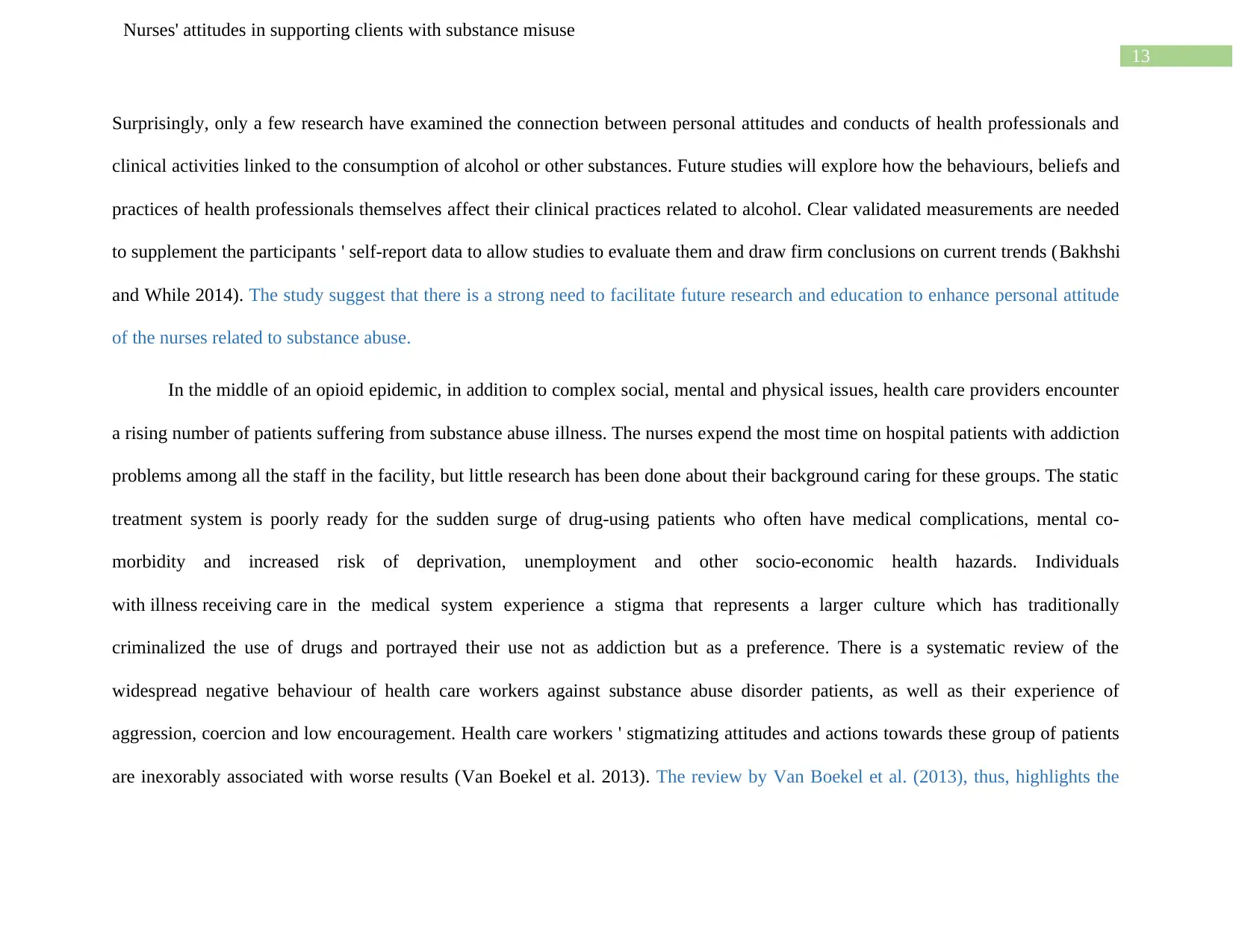
13
Nurses' attitudes in supporting clients with substance misuse
Surprisingly, only a few research have examined the connection between personal attitudes and conducts of health professionals and
clinical activities linked to the consumption of alcohol or other substances. Future studies will explore how the behaviours, beliefs and
practices of health professionals themselves affect their clinical practices related to alcohol. Clear validated measurements are needed
to supplement the participants ' self-report data to allow studies to evaluate them and draw firm conclusions on current trends (Bakhshi
and While 2014). The study suggest that there is a strong need to facilitate future research and education to enhance personal attitude
of the nurses related to substance abuse.
In the middle of an opioid epidemic, in addition to complex social, mental and physical issues, health care providers encounter
a rising number of patients suffering from substance abuse illness. The nurses expend the most time on hospital patients with addiction
problems among all the staff in the facility, but little research has been done about their background caring for these groups. The static
treatment system is poorly ready for the sudden surge of drug-using patients who often have medical complications, mental co-
morbidity and increased risk of deprivation, unemployment and other socio-economic health hazards. Individuals
with illness receiving care in the medical system experience a stigma that represents a larger culture which has traditionally
criminalized the use of drugs and portrayed their use not as addiction but as a preference. There is a systematic review of the
widespread negative behaviour of health care workers against substance abuse disorder patients, as well as their experience of
aggression, coercion and low encouragement. Health care workers ' stigmatizing attitudes and actions towards these group of patients
are inexorably associated with worse results (Van Boekel et al. 2013). The review by Van Boekel et al. (2013), thus, highlights the
Nurses' attitudes in supporting clients with substance misuse
Surprisingly, only a few research have examined the connection between personal attitudes and conducts of health professionals and
clinical activities linked to the consumption of alcohol or other substances. Future studies will explore how the behaviours, beliefs and
practices of health professionals themselves affect their clinical practices related to alcohol. Clear validated measurements are needed
to supplement the participants ' self-report data to allow studies to evaluate them and draw firm conclusions on current trends (Bakhshi
and While 2014). The study suggest that there is a strong need to facilitate future research and education to enhance personal attitude
of the nurses related to substance abuse.
In the middle of an opioid epidemic, in addition to complex social, mental and physical issues, health care providers encounter
a rising number of patients suffering from substance abuse illness. The nurses expend the most time on hospital patients with addiction
problems among all the staff in the facility, but little research has been done about their background caring for these groups. The static
treatment system is poorly ready for the sudden surge of drug-using patients who often have medical complications, mental co-
morbidity and increased risk of deprivation, unemployment and other socio-economic health hazards. Individuals
with illness receiving care in the medical system experience a stigma that represents a larger culture which has traditionally
criminalized the use of drugs and portrayed their use not as addiction but as a preference. There is a systematic review of the
widespread negative behaviour of health care workers against substance abuse disorder patients, as well as their experience of
aggression, coercion and low encouragement. Health care workers ' stigmatizing attitudes and actions towards these group of patients
are inexorably associated with worse results (Van Boekel et al. 2013). The review by Van Boekel et al. (2013), thus, highlights the
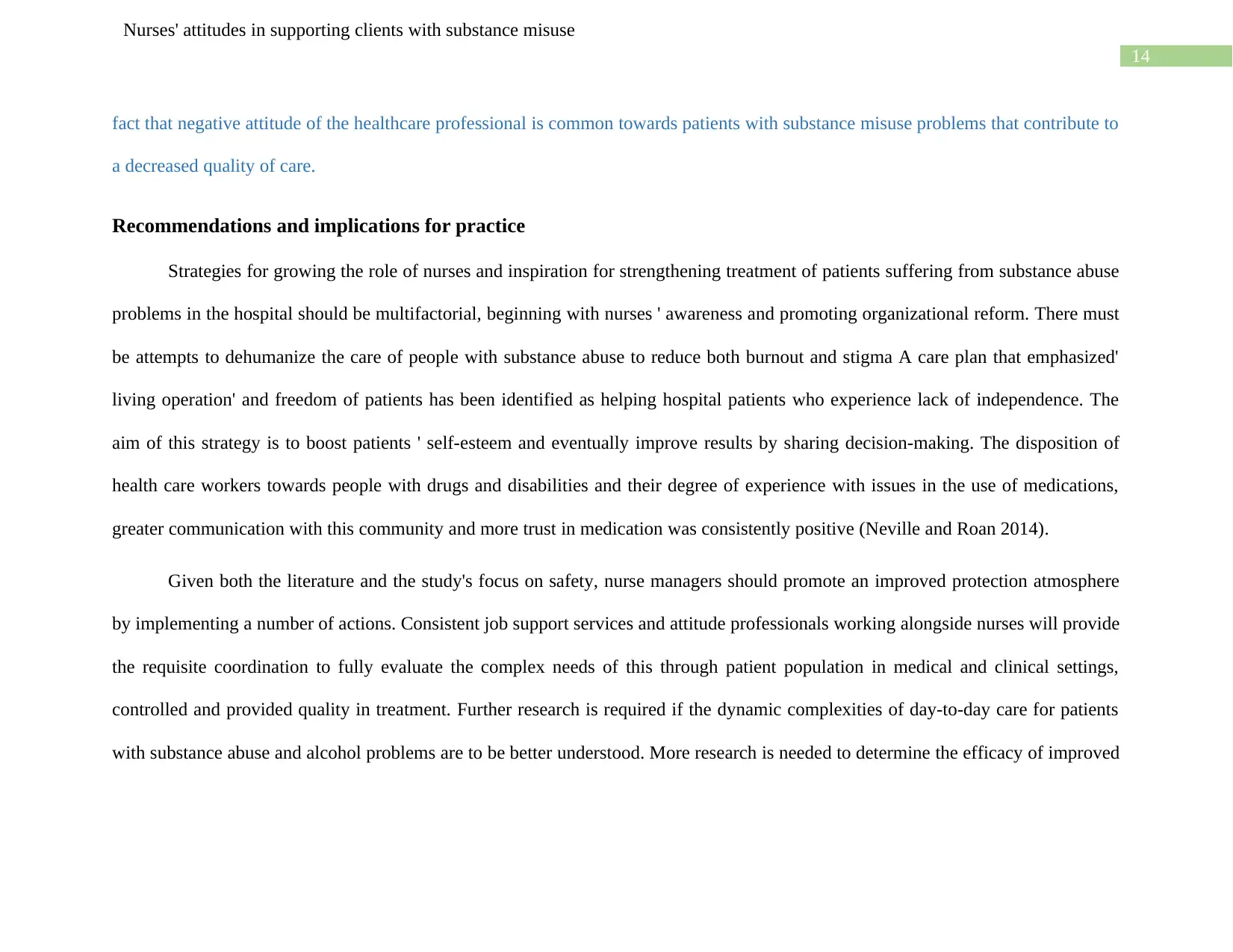
14
Nurses' attitudes in supporting clients with substance misuse
fact that negative attitude of the healthcare professional is common towards patients with substance misuse problems that contribute to
a decreased quality of care.
Recommendations and implications for practice
Strategies for growing the role of nurses and inspiration for strengthening treatment of patients suffering from substance abuse
problems in the hospital should be multifactorial, beginning with nurses ' awareness and promoting organizational reform. There must
be attempts to dehumanize the care of people with substance abuse to reduce both burnout and stigma A care plan that emphasized'
living operation' and freedom of patients has been identified as helping hospital patients who experience lack of independence. The
aim of this strategy is to boost patients ' self-esteem and eventually improve results by sharing decision-making. The disposition of
health care workers towards people with drugs and disabilities and their degree of experience with issues in the use of medications,
greater communication with this community and more trust in medication was consistently positive (Neville and Roan 2014).
Given both the literature and the study's focus on safety, nurse managers should promote an improved protection atmosphere
by implementing a number of actions. Consistent job support services and attitude professionals working alongside nurses will provide
the requisite coordination to fully evaluate the complex needs of this through patient population in medical and clinical settings,
controlled and provided quality in treatment. Further research is required if the dynamic complexities of day-to-day care for patients
with substance abuse and alcohol problems are to be better understood. More research is needed to determine the efficacy of improved
Nurses' attitudes in supporting clients with substance misuse
fact that negative attitude of the healthcare professional is common towards patients with substance misuse problems that contribute to
a decreased quality of care.
Recommendations and implications for practice
Strategies for growing the role of nurses and inspiration for strengthening treatment of patients suffering from substance abuse
problems in the hospital should be multifactorial, beginning with nurses ' awareness and promoting organizational reform. There must
be attempts to dehumanize the care of people with substance abuse to reduce both burnout and stigma A care plan that emphasized'
living operation' and freedom of patients has been identified as helping hospital patients who experience lack of independence. The
aim of this strategy is to boost patients ' self-esteem and eventually improve results by sharing decision-making. The disposition of
health care workers towards people with drugs and disabilities and their degree of experience with issues in the use of medications,
greater communication with this community and more trust in medication was consistently positive (Neville and Roan 2014).
Given both the literature and the study's focus on safety, nurse managers should promote an improved protection atmosphere
by implementing a number of actions. Consistent job support services and attitude professionals working alongside nurses will provide
the requisite coordination to fully evaluate the complex needs of this through patient population in medical and clinical settings,
controlled and provided quality in treatment. Further research is required if the dynamic complexities of day-to-day care for patients
with substance abuse and alcohol problems are to be better understood. More research is needed to determine the efficacy of improved
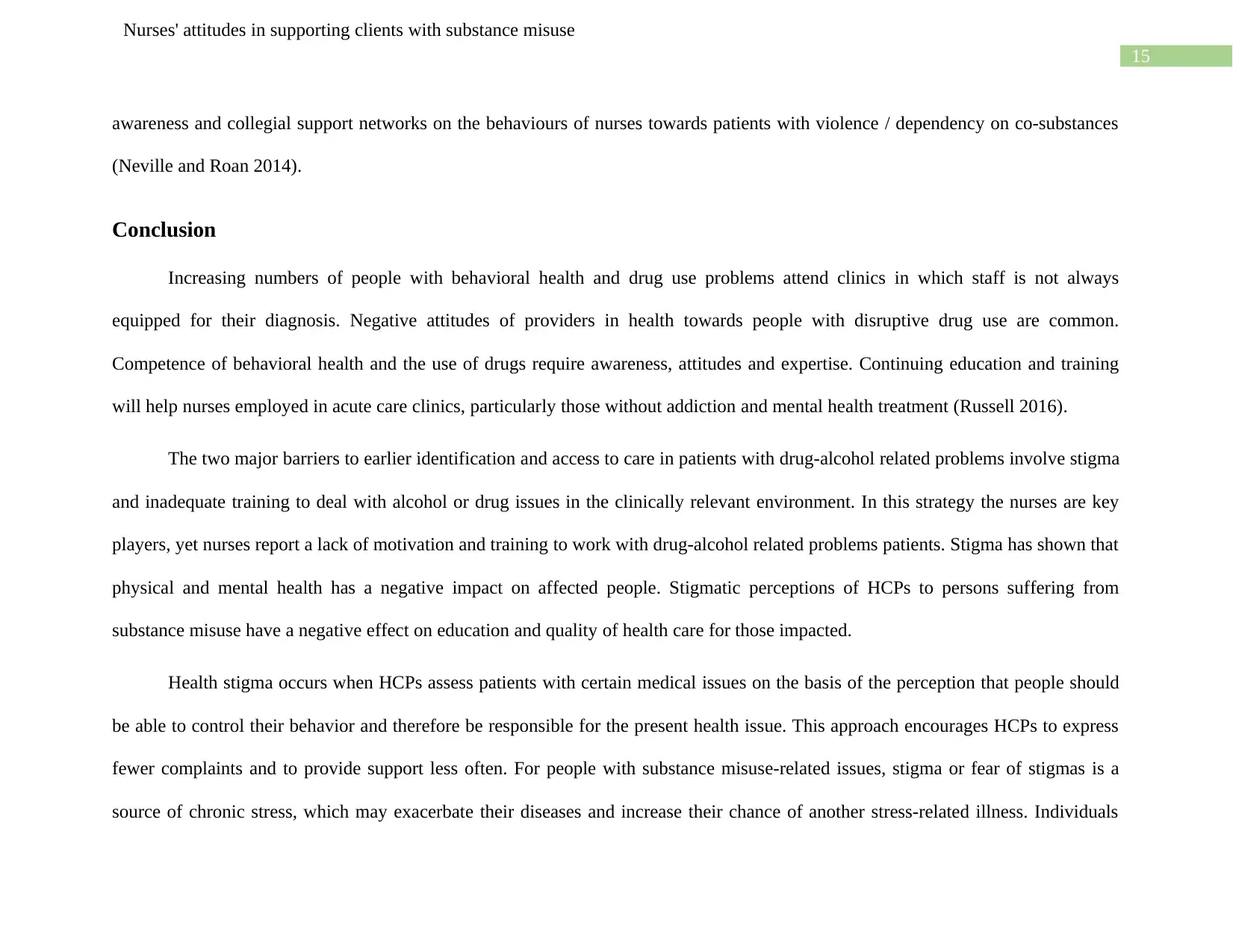
15
Nurses' attitudes in supporting clients with substance misuse
awareness and collegial support networks on the behaviours of nurses towards patients with violence / dependency on co-substances
(Neville and Roan 2014).
Conclusion
Increasing numbers of people with behavioral health and drug use problems attend clinics in which staff is not always
equipped for their diagnosis. Negative attitudes of providers in health towards people with disruptive drug use are common.
Competence of behavioral health and the use of drugs require awareness, attitudes and expertise. Continuing education and training
will help nurses employed in acute care clinics, particularly those without addiction and mental health treatment (Russell 2016).
The two major barriers to earlier identification and access to care in patients with drug-alcohol related problems involve stigma
and inadequate training to deal with alcohol or drug issues in the clinically relevant environment. In this strategy the nurses are key
players, yet nurses report a lack of motivation and training to work with drug-alcohol related problems patients. Stigma has shown that
physical and mental health has a negative impact on affected people. Stigmatic perceptions of HCPs to persons suffering from
substance misuse have a negative effect on education and quality of health care for those impacted.
Health stigma occurs when HCPs assess patients with certain medical issues on the basis of the perception that people should
be able to control their behavior and therefore be responsible for the present health issue. This approach encourages HCPs to express
fewer complaints and to provide support less often. For people with substance misuse-related issues, stigma or fear of stigmas is a
source of chronic stress, which may exacerbate their diseases and increase their chance of another stress-related illness. Individuals
Nurses' attitudes in supporting clients with substance misuse
awareness and collegial support networks on the behaviours of nurses towards patients with violence / dependency on co-substances
(Neville and Roan 2014).
Conclusion
Increasing numbers of people with behavioral health and drug use problems attend clinics in which staff is not always
equipped for their diagnosis. Negative attitudes of providers in health towards people with disruptive drug use are common.
Competence of behavioral health and the use of drugs require awareness, attitudes and expertise. Continuing education and training
will help nurses employed in acute care clinics, particularly those without addiction and mental health treatment (Russell 2016).
The two major barriers to earlier identification and access to care in patients with drug-alcohol related problems involve stigma
and inadequate training to deal with alcohol or drug issues in the clinically relevant environment. In this strategy the nurses are key
players, yet nurses report a lack of motivation and training to work with drug-alcohol related problems patients. Stigma has shown that
physical and mental health has a negative impact on affected people. Stigmatic perceptions of HCPs to persons suffering from
substance misuse have a negative effect on education and quality of health care for those impacted.
Health stigma occurs when HCPs assess patients with certain medical issues on the basis of the perception that people should
be able to control their behavior and therefore be responsible for the present health issue. This approach encourages HCPs to express
fewer complaints and to provide support less often. For people with substance misuse-related issues, stigma or fear of stigmas is a
source of chronic stress, which may exacerbate their diseases and increase their chance of another stress-related illness. Individuals
Secure Best Marks with AI Grader
Need help grading? Try our AI Grader for instant feedback on your assignments.
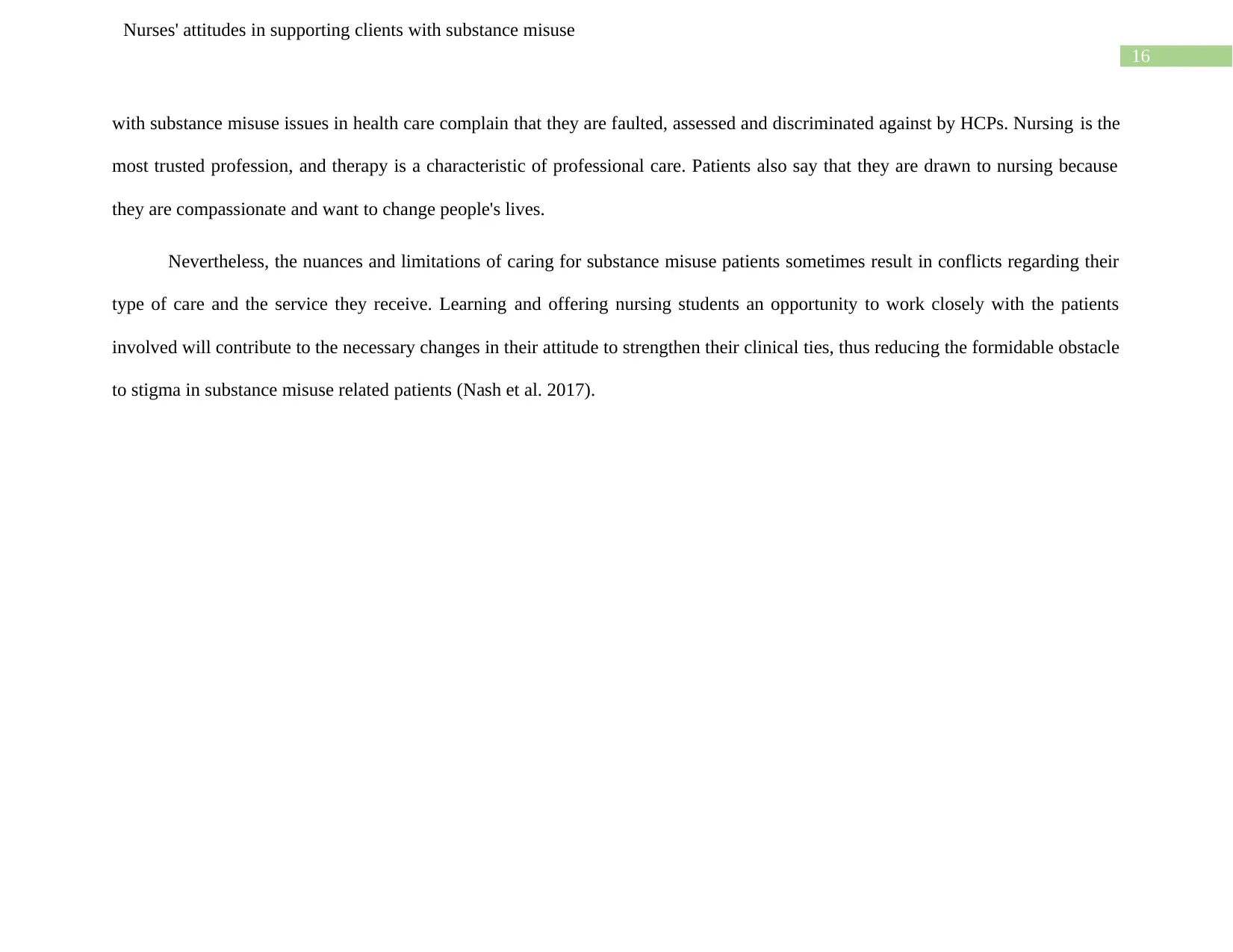
16
Nurses' attitudes in supporting clients with substance misuse
with substance misuse issues in health care complain that they are faulted, assessed and discriminated against by HCPs. Nursing is the
most trusted profession, and therapy is a characteristic of professional care. Patients also say that they are drawn to nursing because
they are compassionate and want to change people's lives.
Nevertheless, the nuances and limitations of caring for substance misuse patients sometimes result in conflicts regarding their
type of care and the service they receive. Learning and offering nursing students an opportunity to work closely with the patients
involved will contribute to the necessary changes in their attitude to strengthen their clinical ties, thus reducing the formidable obstacle
to stigma in substance misuse related patients (Nash et al. 2017).
Nurses' attitudes in supporting clients with substance misuse
with substance misuse issues in health care complain that they are faulted, assessed and discriminated against by HCPs. Nursing is the
most trusted profession, and therapy is a characteristic of professional care. Patients also say that they are drawn to nursing because
they are compassionate and want to change people's lives.
Nevertheless, the nuances and limitations of caring for substance misuse patients sometimes result in conflicts regarding their
type of care and the service they receive. Learning and offering nursing students an opportunity to work closely with the patients
involved will contribute to the necessary changes in their attitude to strengthen their clinical ties, thus reducing the formidable obstacle
to stigma in substance misuse related patients (Nash et al. 2017).
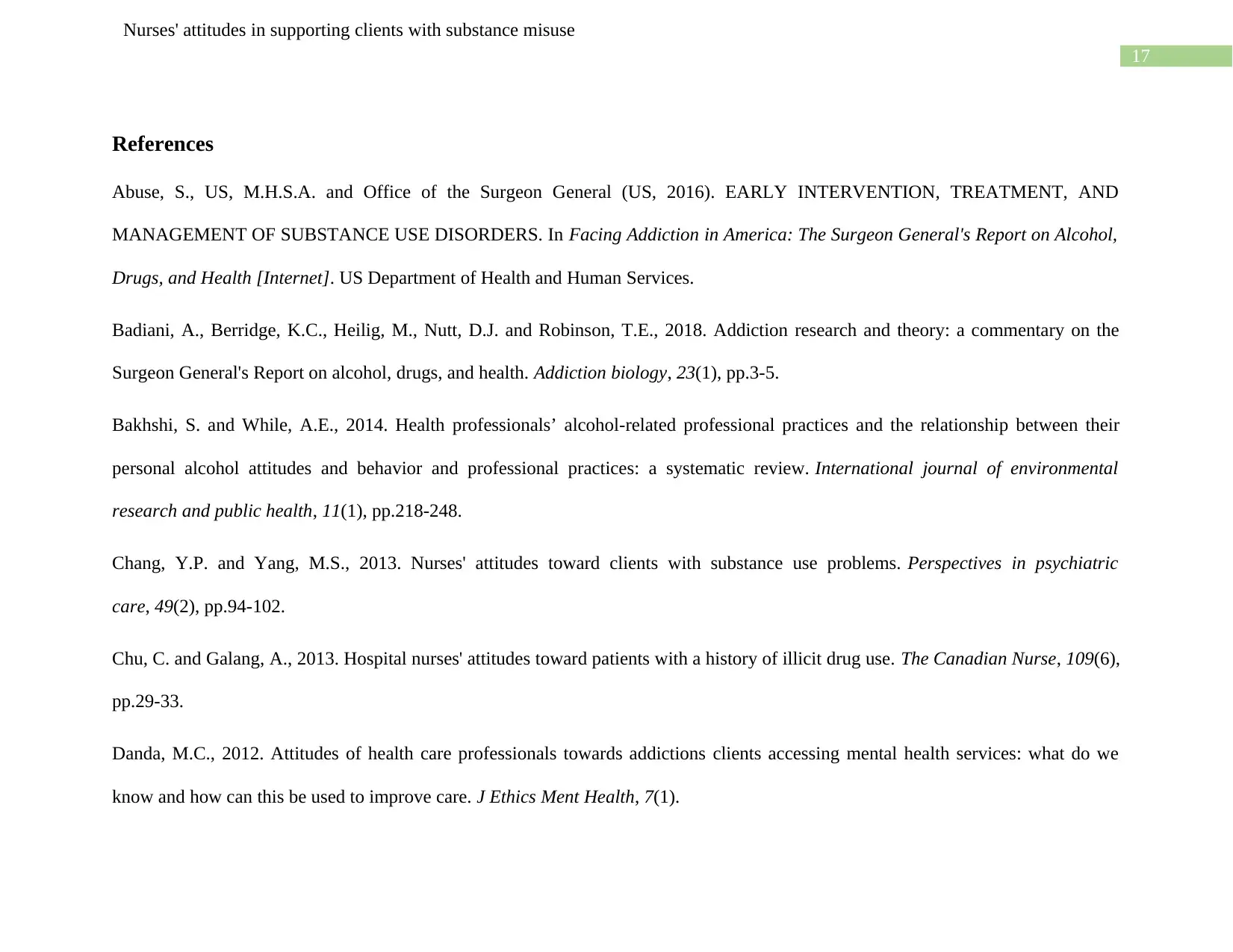
17
Nurses' attitudes in supporting clients with substance misuse
References
Abuse, S., US, M.H.S.A. and Office of the Surgeon General (US, 2016). EARLY INTERVENTION, TREATMENT, AND
MANAGEMENT OF SUBSTANCE USE DISORDERS. In Facing Addiction in America: The Surgeon General's Report on Alcohol,
Drugs, and Health [Internet]. US Department of Health and Human Services.
Badiani, A., Berridge, K.C., Heilig, M., Nutt, D.J. and Robinson, T.E., 2018. Addiction research and theory: a commentary on the
Surgeon General's Report on alcohol, drugs, and health. Addiction biology, 23(1), pp.3-5.
Bakhshi, S. and While, A.E., 2014. Health professionals’ alcohol-related professional practices and the relationship between their
personal alcohol attitudes and behavior and professional practices: a systematic review. International journal of environmental
research and public health, 11(1), pp.218-248.
Chang, Y.P. and Yang, M.S., 2013. Nurses' attitudes toward clients with substance use problems. Perspectives in psychiatric
care, 49(2), pp.94-102.
Chu, C. and Galang, A., 2013. Hospital nurses' attitudes toward patients with a history of illicit drug use. The Canadian Nurse, 109(6),
pp.29-33.
Danda, M.C., 2012. Attitudes of health care professionals towards addictions clients accessing mental health services: what do we
know and how can this be used to improve care. J Ethics Ment Health, 7(1).
Nurses' attitudes in supporting clients with substance misuse
References
Abuse, S., US, M.H.S.A. and Office of the Surgeon General (US, 2016). EARLY INTERVENTION, TREATMENT, AND
MANAGEMENT OF SUBSTANCE USE DISORDERS. In Facing Addiction in America: The Surgeon General's Report on Alcohol,
Drugs, and Health [Internet]. US Department of Health and Human Services.
Badiani, A., Berridge, K.C., Heilig, M., Nutt, D.J. and Robinson, T.E., 2018. Addiction research and theory: a commentary on the
Surgeon General's Report on alcohol, drugs, and health. Addiction biology, 23(1), pp.3-5.
Bakhshi, S. and While, A.E., 2014. Health professionals’ alcohol-related professional practices and the relationship between their
personal alcohol attitudes and behavior and professional practices: a systematic review. International journal of environmental
research and public health, 11(1), pp.218-248.
Chang, Y.P. and Yang, M.S., 2013. Nurses' attitudes toward clients with substance use problems. Perspectives in psychiatric
care, 49(2), pp.94-102.
Chu, C. and Galang, A., 2013. Hospital nurses' attitudes toward patients with a history of illicit drug use. The Canadian Nurse, 109(6),
pp.29-33.
Danda, M.C., 2012. Attitudes of health care professionals towards addictions clients accessing mental health services: what do we
know and how can this be used to improve care. J Ethics Ment Health, 7(1).
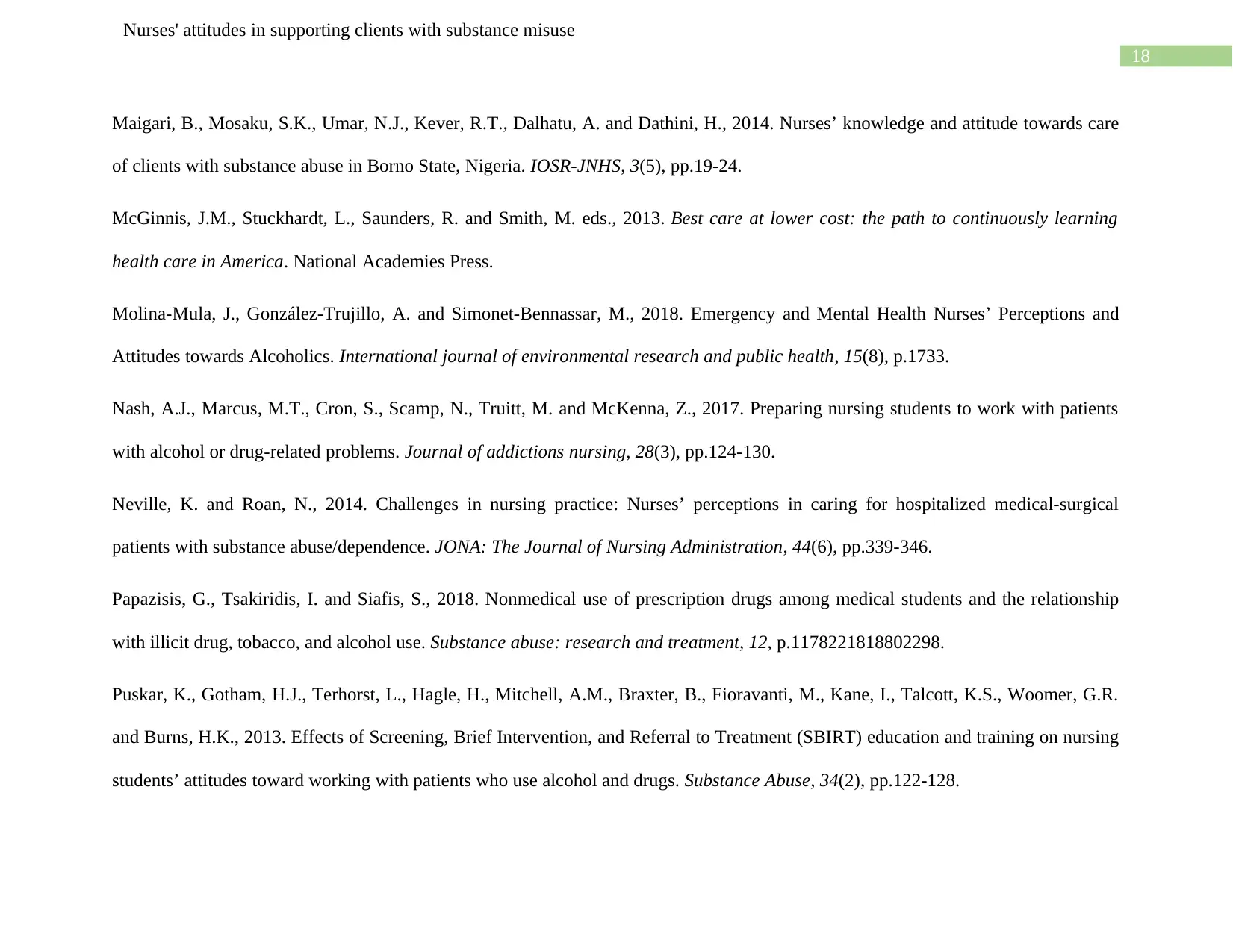
18
Nurses' attitudes in supporting clients with substance misuse
Maigari, B., Mosaku, S.K., Umar, N.J., Kever, R.T., Dalhatu, A. and Dathini, H., 2014. Nurses’ knowledge and attitude towards care
of clients with substance abuse in Borno State, Nigeria. IOSR-JNHS, 3(5), pp.19-24.
McGinnis, J.M., Stuckhardt, L., Saunders, R. and Smith, M. eds., 2013. Best care at lower cost: the path to continuously learning
health care in America. National Academies Press.
Molina-Mula, J., González-Trujillo, A. and Simonet-Bennassar, M., 2018. Emergency and Mental Health Nurses’ Perceptions and
Attitudes towards Alcoholics. International journal of environmental research and public health, 15(8), p.1733.
Nash, A.J., Marcus, M.T., Cron, S., Scamp, N., Truitt, M. and McKenna, Z., 2017. Preparing nursing students to work with patients
with alcohol or drug-related problems. Journal of addictions nursing, 28(3), pp.124-130.
Neville, K. and Roan, N., 2014. Challenges in nursing practice: Nurses’ perceptions in caring for hospitalized medical-surgical
patients with substance abuse/dependence. JONA: The Journal of Nursing Administration, 44(6), pp.339-346.
Papazisis, G., Tsakiridis, I. and Siafis, S., 2018. Nonmedical use of prescription drugs among medical students and the relationship
with illicit drug, tobacco, and alcohol use. Substance abuse: research and treatment, 12, p.1178221818802298.
Puskar, K., Gotham, H.J., Terhorst, L., Hagle, H., Mitchell, A.M., Braxter, B., Fioravanti, M., Kane, I., Talcott, K.S., Woomer, G.R.
and Burns, H.K., 2013. Effects of Screening, Brief Intervention, and Referral to Treatment (SBIRT) education and training on nursing
students’ attitudes toward working with patients who use alcohol and drugs. Substance Abuse, 34(2), pp.122-128.
Nurses' attitudes in supporting clients with substance misuse
Maigari, B., Mosaku, S.K., Umar, N.J., Kever, R.T., Dalhatu, A. and Dathini, H., 2014. Nurses’ knowledge and attitude towards care
of clients with substance abuse in Borno State, Nigeria. IOSR-JNHS, 3(5), pp.19-24.
McGinnis, J.M., Stuckhardt, L., Saunders, R. and Smith, M. eds., 2013. Best care at lower cost: the path to continuously learning
health care in America. National Academies Press.
Molina-Mula, J., González-Trujillo, A. and Simonet-Bennassar, M., 2018. Emergency and Mental Health Nurses’ Perceptions and
Attitudes towards Alcoholics. International journal of environmental research and public health, 15(8), p.1733.
Nash, A.J., Marcus, M.T., Cron, S., Scamp, N., Truitt, M. and McKenna, Z., 2017. Preparing nursing students to work with patients
with alcohol or drug-related problems. Journal of addictions nursing, 28(3), pp.124-130.
Neville, K. and Roan, N., 2014. Challenges in nursing practice: Nurses’ perceptions in caring for hospitalized medical-surgical
patients with substance abuse/dependence. JONA: The Journal of Nursing Administration, 44(6), pp.339-346.
Papazisis, G., Tsakiridis, I. and Siafis, S., 2018. Nonmedical use of prescription drugs among medical students and the relationship
with illicit drug, tobacco, and alcohol use. Substance abuse: research and treatment, 12, p.1178221818802298.
Puskar, K., Gotham, H.J., Terhorst, L., Hagle, H., Mitchell, A.M., Braxter, B., Fioravanti, M., Kane, I., Talcott, K.S., Woomer, G.R.
and Burns, H.K., 2013. Effects of Screening, Brief Intervention, and Referral to Treatment (SBIRT) education and training on nursing
students’ attitudes toward working with patients who use alcohol and drugs. Substance Abuse, 34(2), pp.122-128.
Paraphrase This Document
Need a fresh take? Get an instant paraphrase of this document with our AI Paraphraser
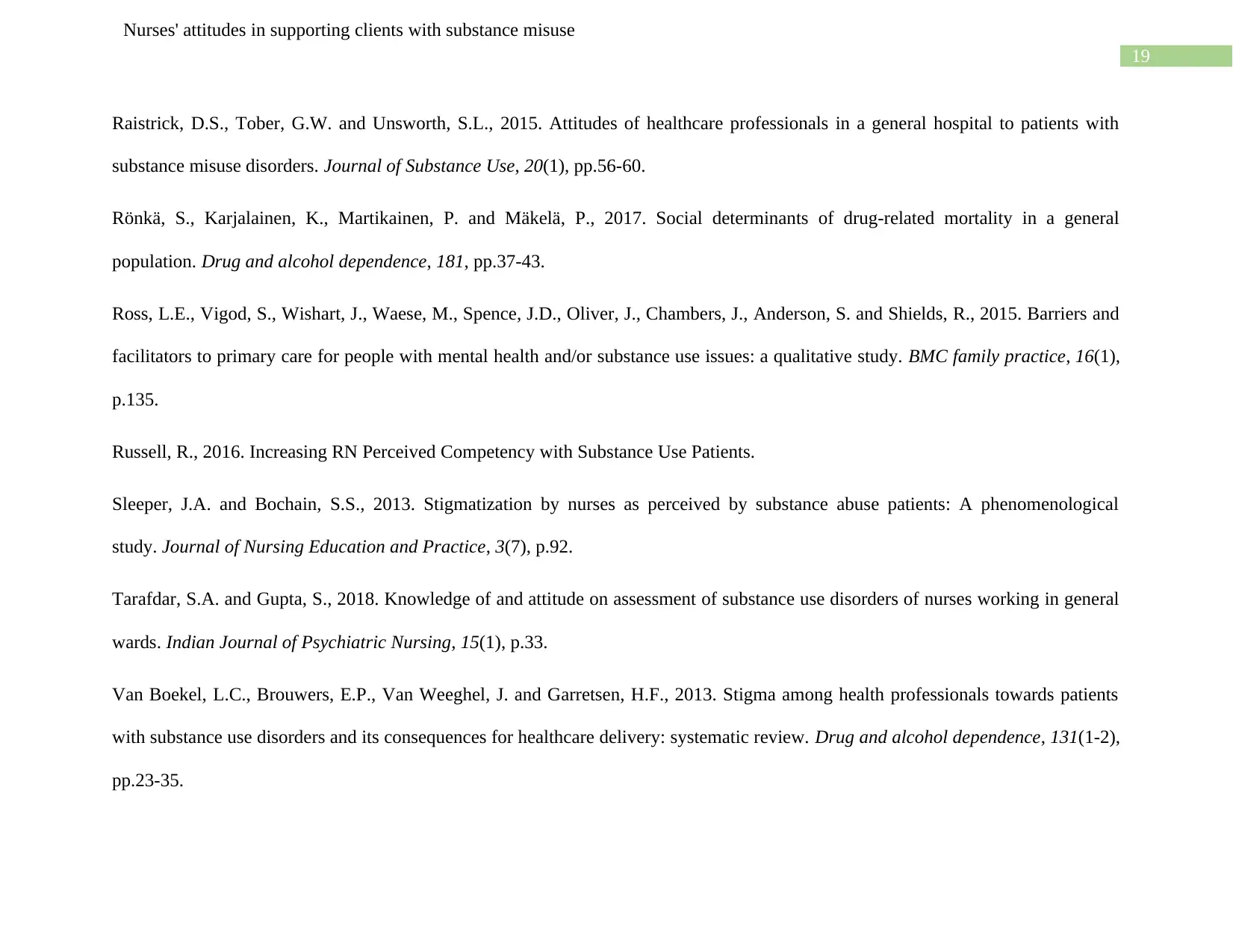
19
Nurses' attitudes in supporting clients with substance misuse
Raistrick, D.S., Tober, G.W. and Unsworth, S.L., 2015. Attitudes of healthcare professionals in a general hospital to patients with
substance misuse disorders. Journal of Substance Use, 20(1), pp.56-60.
Rönkä, S., Karjalainen, K., Martikainen, P. and Mäkelä, P., 2017. Social determinants of drug-related mortality in a general
population. Drug and alcohol dependence, 181, pp.37-43.
Ross, L.E., Vigod, S., Wishart, J., Waese, M., Spence, J.D., Oliver, J., Chambers, J., Anderson, S. and Shields, R., 2015. Barriers and
facilitators to primary care for people with mental health and/or substance use issues: a qualitative study. BMC family practice, 16(1),
p.135.
Russell, R., 2016. Increasing RN Perceived Competency with Substance Use Patients.
Sleeper, J.A. and Bochain, S.S., 2013. Stigmatization by nurses as perceived by substance abuse patients: A phenomenological
study. Journal of Nursing Education and Practice, 3(7), p.92.
Tarafdar, S.A. and Gupta, S., 2018. Knowledge of and attitude on assessment of substance use disorders of nurses working in general
wards. Indian Journal of Psychiatric Nursing, 15(1), p.33.
Van Boekel, L.C., Brouwers, E.P., Van Weeghel, J. and Garretsen, H.F., 2013. Stigma among health professionals towards patients
with substance use disorders and its consequences for healthcare delivery: systematic review. Drug and alcohol dependence, 131(1-2),
pp.23-35.
Nurses' attitudes in supporting clients with substance misuse
Raistrick, D.S., Tober, G.W. and Unsworth, S.L., 2015. Attitudes of healthcare professionals in a general hospital to patients with
substance misuse disorders. Journal of Substance Use, 20(1), pp.56-60.
Rönkä, S., Karjalainen, K., Martikainen, P. and Mäkelä, P., 2017. Social determinants of drug-related mortality in a general
population. Drug and alcohol dependence, 181, pp.37-43.
Ross, L.E., Vigod, S., Wishart, J., Waese, M., Spence, J.D., Oliver, J., Chambers, J., Anderson, S. and Shields, R., 2015. Barriers and
facilitators to primary care for people with mental health and/or substance use issues: a qualitative study. BMC family practice, 16(1),
p.135.
Russell, R., 2016. Increasing RN Perceived Competency with Substance Use Patients.
Sleeper, J.A. and Bochain, S.S., 2013. Stigmatization by nurses as perceived by substance abuse patients: A phenomenological
study. Journal of Nursing Education and Practice, 3(7), p.92.
Tarafdar, S.A. and Gupta, S., 2018. Knowledge of and attitude on assessment of substance use disorders of nurses working in general
wards. Indian Journal of Psychiatric Nursing, 15(1), p.33.
Van Boekel, L.C., Brouwers, E.P., Van Weeghel, J. and Garretsen, H.F., 2013. Stigma among health professionals towards patients
with substance use disorders and its consequences for healthcare delivery: systematic review. Drug and alcohol dependence, 131(1-2),
pp.23-35.
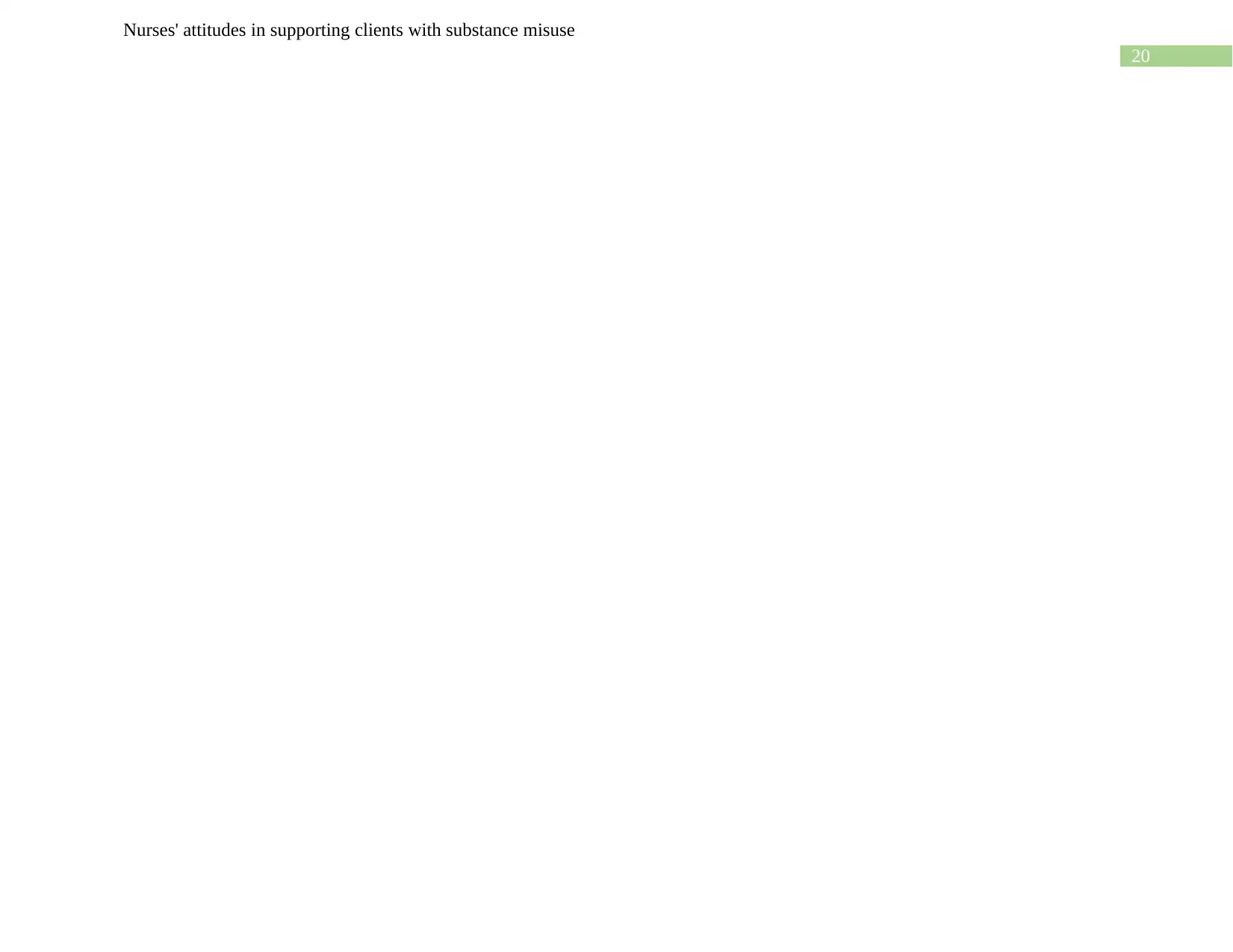
20
Nurses' attitudes in supporting clients with substance misuse
Nurses' attitudes in supporting clients with substance misuse
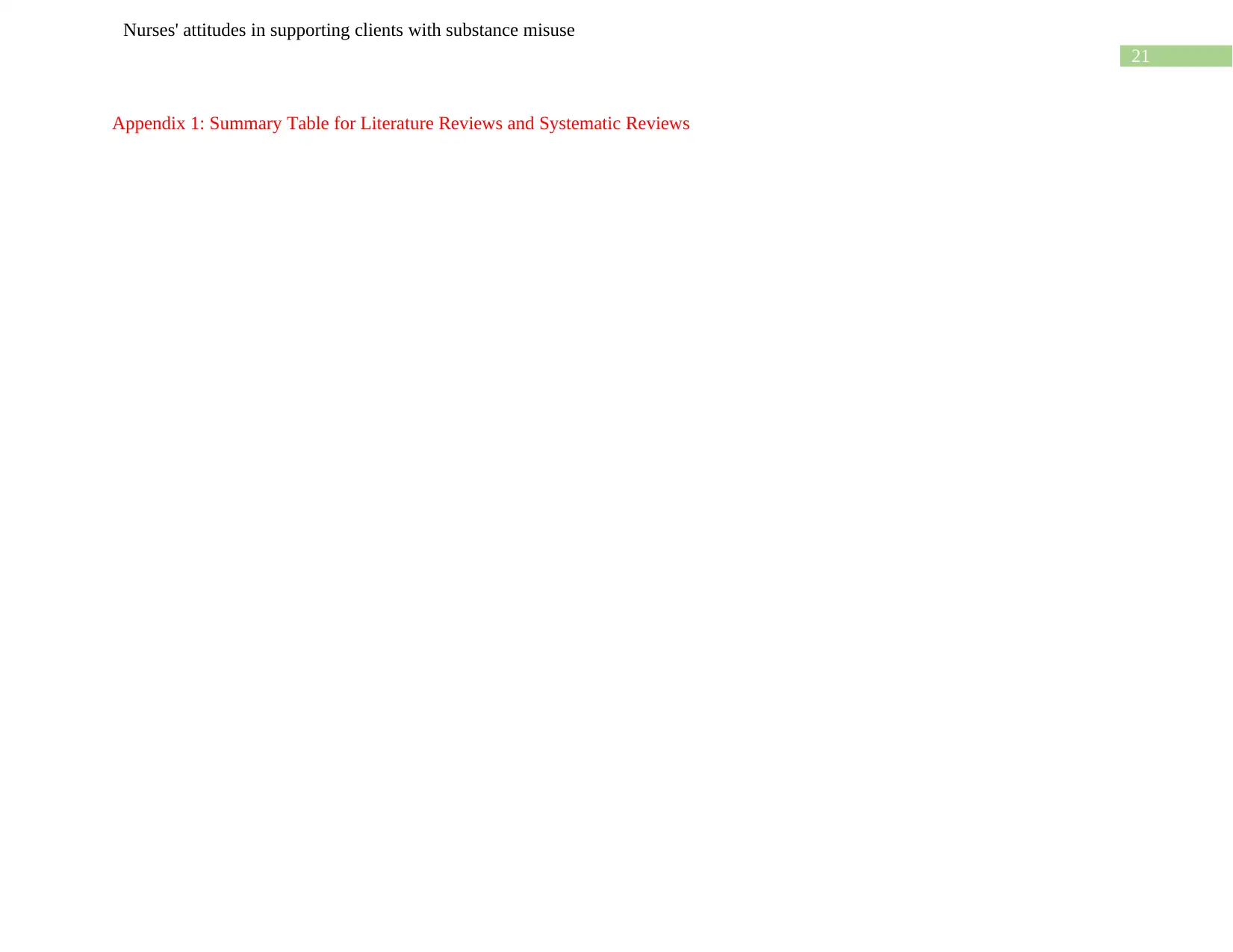
21
Nurses' attitudes in supporting clients with substance misuse
Appendix 1: Summary Table for Literature Reviews and Systematic Reviews
Nurses' attitudes in supporting clients with substance misuse
Appendix 1: Summary Table for Literature Reviews and Systematic Reviews
Secure Best Marks with AI Grader
Need help grading? Try our AI Grader for instant feedback on your assignments.
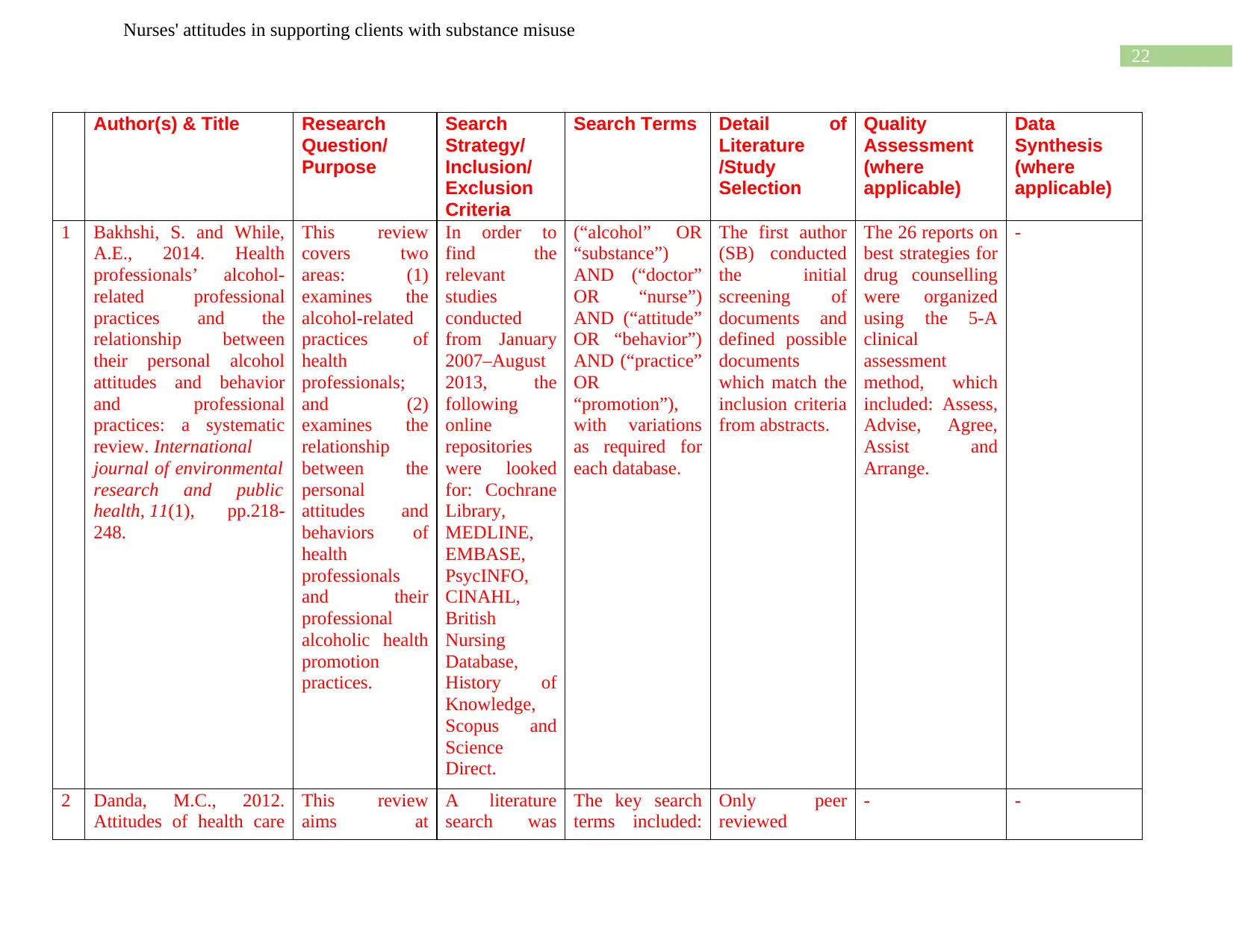
22
Nurses' attitudes in supporting clients with substance misuse
Author(s) & Title Research
Question/
Purpose
Search
Strategy/
Inclusion/
Exclusion
Criteria
Search Terms Detail of
Literature
/Study
Selection
Quality
Assessment
(where
applicable)
Data
Synthesis
(where
applicable)
1 Bakhshi, S. and While,
A.E., 2014. Health
professionals’ alcohol-
related professional
practices and the
relationship between
their personal alcohol
attitudes and behavior
and professional
practices: a systematic
review. International
journal of environmental
research and public
health, 11(1), pp.218-
248.
This review
covers two
areas: (1)
examines the
alcohol-related
practices of
health
professionals;
and (2)
examines the
relationship
between the
personal
attitudes and
behaviors of
health
professionals
and their
professional
alcoholic health
promotion
practices.
In order to
find the
relevant
studies
conducted
from January
2007–August
2013, the
following
online
repositories
were looked
for: Cochrane
Library,
MEDLINE,
EMBASE,
PsycINFO,
CINAHL,
British
Nursing
Database,
History of
Knowledge,
Scopus and
Science
Direct.
(“alcohol” OR
“substance”)
AND (“doctor”
OR “nurse”)
AND (“attitude”
OR “behavior”)
AND (“practice”
OR
“promotion”),
with variations
as required for
each database.
The first author
(SB) conducted
the initial
screening of
documents and
defined possible
documents
which match the
inclusion criteria
from abstracts.
The 26 reports on
best strategies for
drug counselling
were organized
using the 5-A
clinical
assessment
method, which
included: Assess,
Advise, Agree,
Assist and
Arrange.
-
2 Danda, M.C., 2012.
Attitudes of health care
This review
aims at
A literature
search was
The key search
terms included:
Only peer
reviewed
- -
Nurses' attitudes in supporting clients with substance misuse
Author(s) & Title Research
Question/
Purpose
Search
Strategy/
Inclusion/
Exclusion
Criteria
Search Terms Detail of
Literature
/Study
Selection
Quality
Assessment
(where
applicable)
Data
Synthesis
(where
applicable)
1 Bakhshi, S. and While,
A.E., 2014. Health
professionals’ alcohol-
related professional
practices and the
relationship between
their personal alcohol
attitudes and behavior
and professional
practices: a systematic
review. International
journal of environmental
research and public
health, 11(1), pp.218-
248.
This review
covers two
areas: (1)
examines the
alcohol-related
practices of
health
professionals;
and (2)
examines the
relationship
between the
personal
attitudes and
behaviors of
health
professionals
and their
professional
alcoholic health
promotion
practices.
In order to
find the
relevant
studies
conducted
from January
2007–August
2013, the
following
online
repositories
were looked
for: Cochrane
Library,
MEDLINE,
EMBASE,
PsycINFO,
CINAHL,
British
Nursing
Database,
History of
Knowledge,
Scopus and
Science
Direct.
(“alcohol” OR
“substance”)
AND (“doctor”
OR “nurse”)
AND (“attitude”
OR “behavior”)
AND (“practice”
OR
“promotion”),
with variations
as required for
each database.
The first author
(SB) conducted
the initial
screening of
documents and
defined possible
documents
which match the
inclusion criteria
from abstracts.
The 26 reports on
best strategies for
drug counselling
were organized
using the 5-A
clinical
assessment
method, which
included: Assess,
Advise, Agree,
Assist and
Arrange.
-
2 Danda, M.C., 2012.
Attitudes of health care
This review
aims at
A literature
search was
The key search
terms included:
Only peer
reviewed
- -
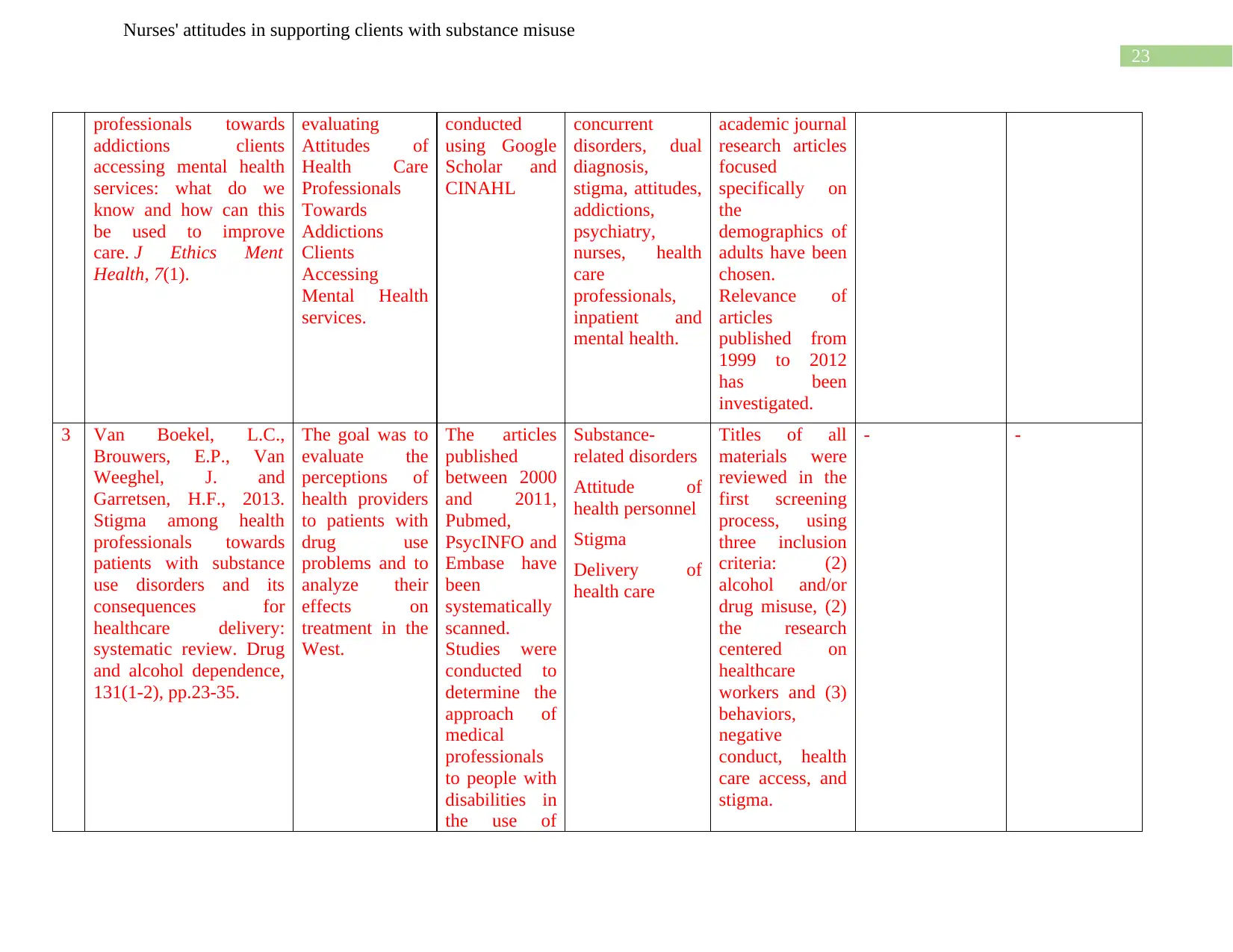
23
Nurses' attitudes in supporting clients with substance misuse
professionals towards
addictions clients
accessing mental health
services: what do we
know and how can this
be used to improve
care. J Ethics Ment
Health, 7(1).
evaluating
Attitudes of
Health Care
Professionals
Towards
Addictions
Clients
Accessing
Mental Health
services.
conducted
using Google
Scholar and
CINAHL
concurrent
disorders, dual
diagnosis,
stigma, attitudes,
addictions,
psychiatry,
nurses, health
care
professionals,
inpatient and
mental health.
academic journal
research articles
focused
specifically on
the
demographics of
adults have been
chosen.
Relevance of
articles
published from
1999 to 2012
has been
investigated.
3 Van Boekel, L.C.,
Brouwers, E.P., Van
Weeghel, J. and
Garretsen, H.F., 2013.
Stigma among health
professionals towards
patients with substance
use disorders and its
consequences for
healthcare delivery:
systematic review. Drug
and alcohol dependence,
131(1-2), pp.23-35.
The goal was to
evaluate the
perceptions of
health providers
to patients with
drug use
problems and to
analyze their
effects on
treatment in the
West.
The articles
published
between 2000
and 2011,
Pubmed,
PsycINFO and
Embase have
been
systematically
scanned.
Studies were
conducted to
determine the
approach of
medical
professionals
to people with
disabilities in
the use of
Substance-
related disorders
Attitude of
health personnel
Stigma
Delivery of
health care
Titles of all
materials were
reviewed in the
first screening
process, using
three inclusion
criteria: (2)
alcohol and/or
drug misuse, (2)
the research
centered on
healthcare
workers and (3)
behaviors,
negative
conduct, health
care access, and
stigma.
- -
Nurses' attitudes in supporting clients with substance misuse
professionals towards
addictions clients
accessing mental health
services: what do we
know and how can this
be used to improve
care. J Ethics Ment
Health, 7(1).
evaluating
Attitudes of
Health Care
Professionals
Towards
Addictions
Clients
Accessing
Mental Health
services.
conducted
using Google
Scholar and
CINAHL
concurrent
disorders, dual
diagnosis,
stigma, attitudes,
addictions,
psychiatry,
nurses, health
care
professionals,
inpatient and
mental health.
academic journal
research articles
focused
specifically on
the
demographics of
adults have been
chosen.
Relevance of
articles
published from
1999 to 2012
has been
investigated.
3 Van Boekel, L.C.,
Brouwers, E.P., Van
Weeghel, J. and
Garretsen, H.F., 2013.
Stigma among health
professionals towards
patients with substance
use disorders and its
consequences for
healthcare delivery:
systematic review. Drug
and alcohol dependence,
131(1-2), pp.23-35.
The goal was to
evaluate the
perceptions of
health providers
to patients with
drug use
problems and to
analyze their
effects on
treatment in the
West.
The articles
published
between 2000
and 2011,
Pubmed,
PsycINFO and
Embase have
been
systematically
scanned.
Studies were
conducted to
determine the
approach of
medical
professionals
to people with
disabilities in
the use of
Substance-
related disorders
Attitude of
health personnel
Stigma
Delivery of
health care
Titles of all
materials were
reviewed in the
first screening
process, using
three inclusion
criteria: (2)
alcohol and/or
drug misuse, (2)
the research
centered on
healthcare
workers and (3)
behaviors,
negative
conduct, health
care access, and
stigma.
- -
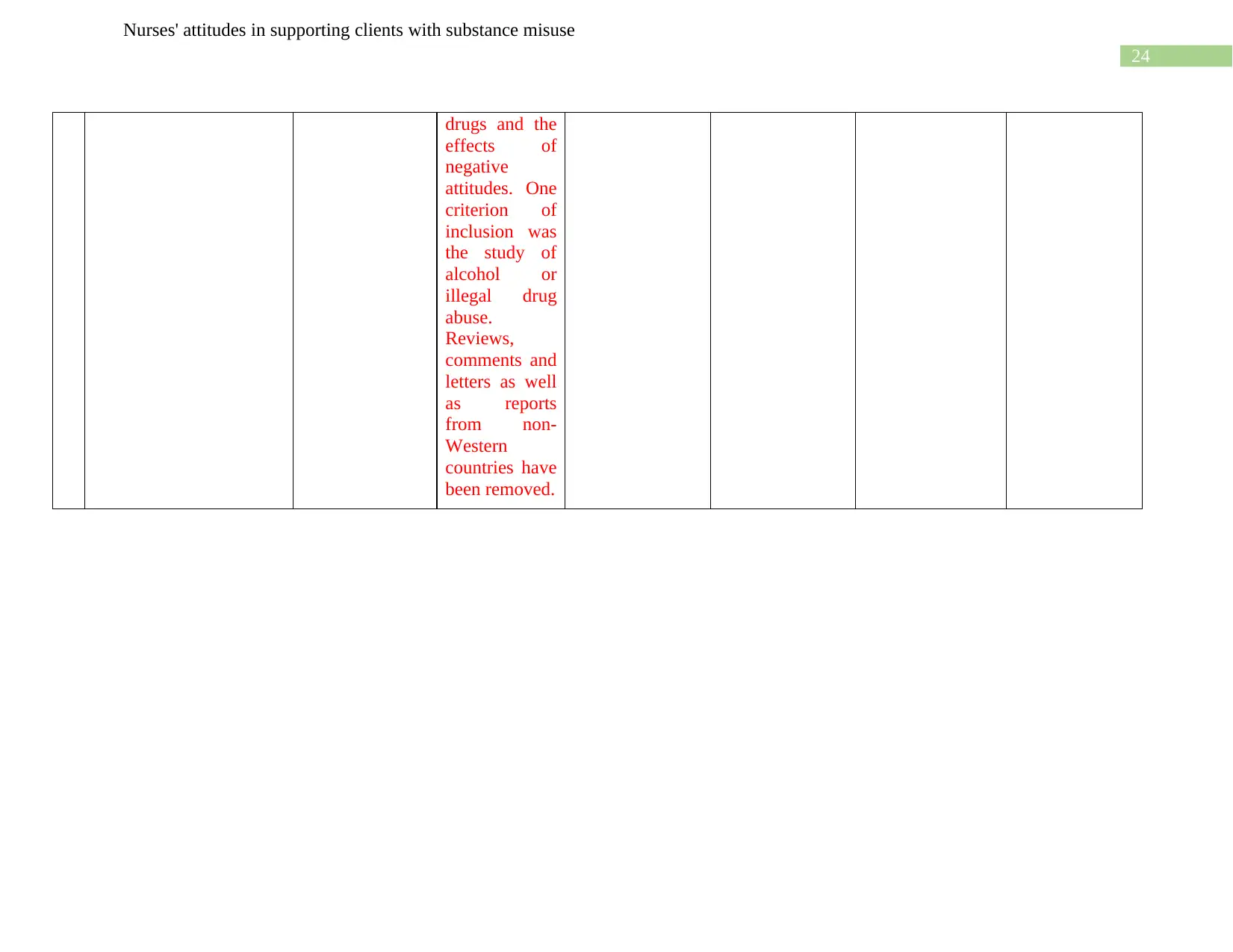
24
Nurses' attitudes in supporting clients with substance misuse
drugs and the
effects of
negative
attitudes. One
criterion of
inclusion was
the study of
alcohol or
illegal drug
abuse.
Reviews,
comments and
letters as well
as reports
from non-
Western
countries have
been removed.
Nurses' attitudes in supporting clients with substance misuse
drugs and the
effects of
negative
attitudes. One
criterion of
inclusion was
the study of
alcohol or
illegal drug
abuse.
Reviews,
comments and
letters as well
as reports
from non-
Western
countries have
been removed.
Paraphrase This Document
Need a fresh take? Get an instant paraphrase of this document with our AI Paraphraser
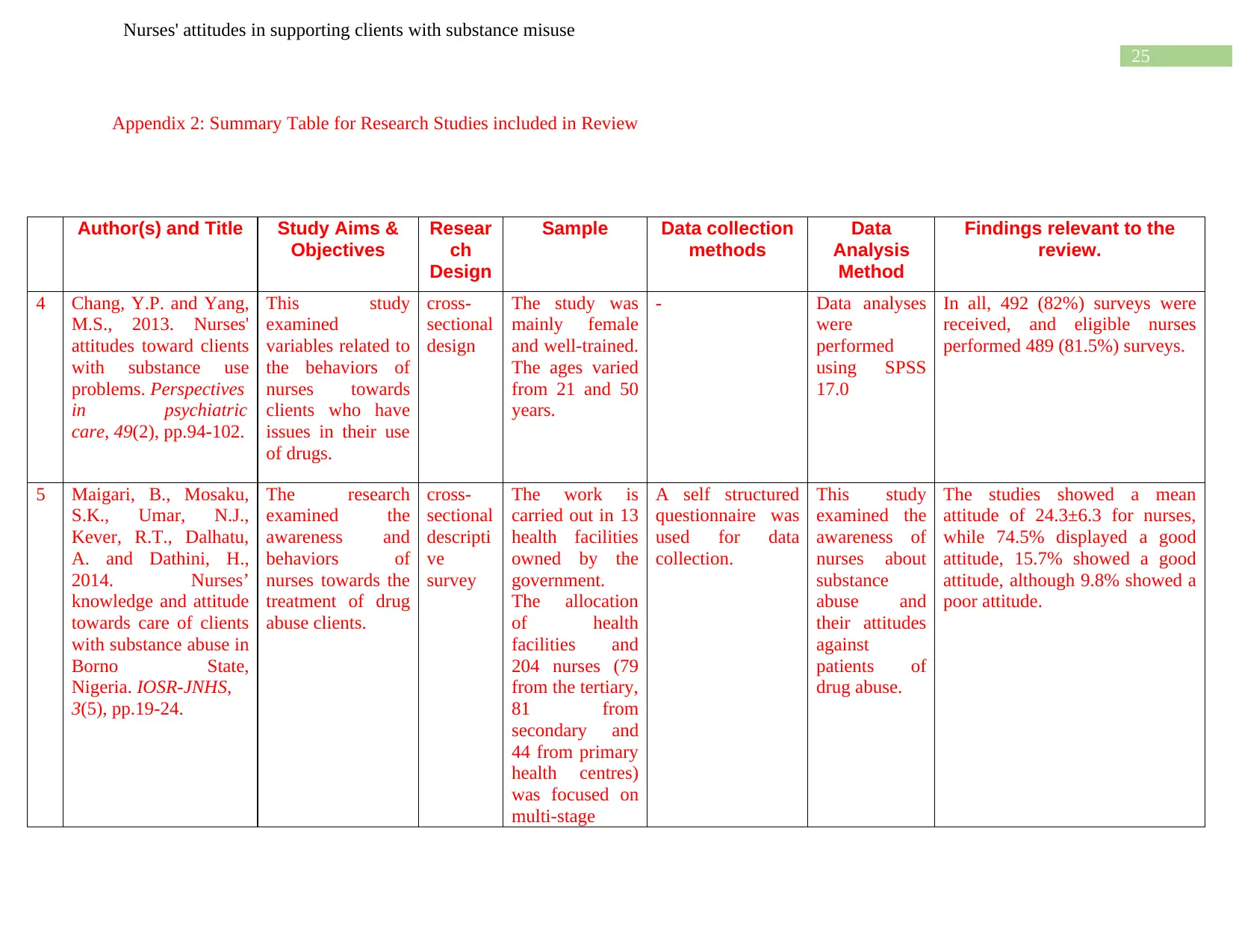
25
Nurses' attitudes in supporting clients with substance misuse
Appendix 2: Summary Table for Research Studies included in Review
Author(s) and Title Study Aims &
Objectives
Resear
ch
Design
Sample Data collection
methods
Data
Analysis
Method
Findings relevant to the
review.
4 Chang, Y.P. and Yang,
M.S., 2013. Nurses'
attitudes toward clients
with substance use
problems. Perspectives
in psychiatric
care, 49(2), pp.94-102.
This study
examined
variables related to
the behaviors of
nurses towards
clients who have
issues in their use
of drugs.
cross-
sectional
design
The study was
mainly female
and well-trained.
The ages varied
from 21 and 50
years.
- Data analyses
were
performed
using SPSS
17.0
In all, 492 (82%) surveys were
received, and eligible nurses
performed 489 (81.5%) surveys.
5 Maigari, B., Mosaku,
S.K., Umar, N.J.,
Kever, R.T., Dalhatu,
A. and Dathini, H.,
2014. Nurses’
knowledge and attitude
towards care of clients
with substance abuse in
Borno State,
Nigeria. IOSR-JNHS,
3(5), pp.19-24.
The research
examined the
awareness and
behaviors of
nurses towards the
treatment of drug
abuse clients.
cross-
sectional
descripti
ve
survey
The work is
carried out in 13
health facilities
owned by the
government.
The allocation
of health
facilities and
204 nurses (79
from the tertiary,
81 from
secondary and
44 from primary
health centres)
was focused on
multi-stage
A self structured
questionnaire was
used for data
collection.
This study
examined the
awareness of
nurses about
substance
abuse and
their attitudes
against
patients of
drug abuse.
The studies showed a mean
attitude of 24.3±6.3 for nurses,
while 74.5% displayed a good
attitude, 15.7% showed a good
attitude, although 9.8% showed a
poor attitude.
Nurses' attitudes in supporting clients with substance misuse
Appendix 2: Summary Table for Research Studies included in Review
Author(s) and Title Study Aims &
Objectives
Resear
ch
Design
Sample Data collection
methods
Data
Analysis
Method
Findings relevant to the
review.
4 Chang, Y.P. and Yang,
M.S., 2013. Nurses'
attitudes toward clients
with substance use
problems. Perspectives
in psychiatric
care, 49(2), pp.94-102.
This study
examined
variables related to
the behaviors of
nurses towards
clients who have
issues in their use
of drugs.
cross-
sectional
design
The study was
mainly female
and well-trained.
The ages varied
from 21 and 50
years.
- Data analyses
were
performed
using SPSS
17.0
In all, 492 (82%) surveys were
received, and eligible nurses
performed 489 (81.5%) surveys.
5 Maigari, B., Mosaku,
S.K., Umar, N.J.,
Kever, R.T., Dalhatu,
A. and Dathini, H.,
2014. Nurses’
knowledge and attitude
towards care of clients
with substance abuse in
Borno State,
Nigeria. IOSR-JNHS,
3(5), pp.19-24.
The research
examined the
awareness and
behaviors of
nurses towards the
treatment of drug
abuse clients.
cross-
sectional
descripti
ve
survey
The work is
carried out in 13
health facilities
owned by the
government.
The allocation
of health
facilities and
204 nurses (79
from the tertiary,
81 from
secondary and
44 from primary
health centres)
was focused on
multi-stage
A self structured
questionnaire was
used for data
collection.
This study
examined the
awareness of
nurses about
substance
abuse and
their attitudes
against
patients of
drug abuse.
The studies showed a mean
attitude of 24.3±6.3 for nurses,
while 74.5% displayed a good
attitude, 15.7% showed a good
attitude, although 9.8% showed a
poor attitude.
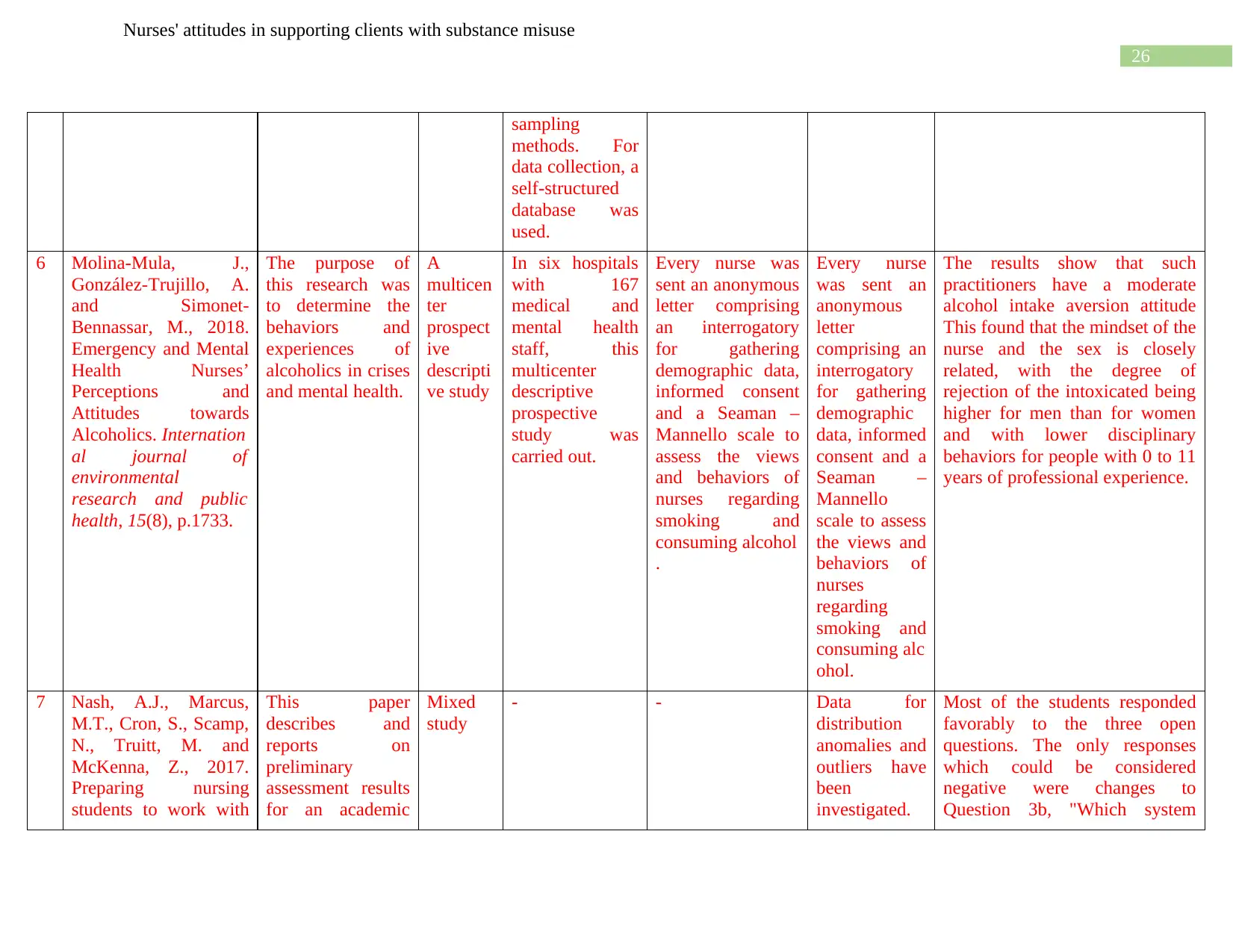
26
Nurses' attitudes in supporting clients with substance misuse
sampling
methods. For
data collection, a
self-structured
database was
used.
6 Molina-Mula, J.,
González-Trujillo, A.
and Simonet-
Bennassar, M., 2018.
Emergency and Mental
Health Nurses’
Perceptions and
Attitudes towards
Alcoholics. Internation
al journal of
environmental
research and public
health, 15(8), p.1733.
The purpose of
this research was
to determine the
behaviors and
experiences of
alcoholics in crises
and mental health.
A
multicen
ter
prospect
ive
descripti
ve study
In six hospitals
with 167
medical and
mental health
staff, this
multicenter
descriptive
prospective
study was
carried out.
Every nurse was
sent an anonymous
letter comprising
an interrogatory
for gathering
demographic data,
informed consent
and a Seaman –
Mannello scale to
assess the views
and behaviors of
nurses regarding
smoking and
consuming alcohol
.
Every nurse
was sent an
anonymous
letter
comprising an
interrogatory
for gathering
demographic
data, informed
consent and a
Seaman –
Mannello
scale to assess
the views and
behaviors of
nurses
regarding
smoking and
consuming alc
ohol.
The results show that such
practitioners have a moderate
alcohol intake aversion attitude
This found that the mindset of the
nurse and the sex is closely
related, with the degree of
rejection of the intoxicated being
higher for men than for women
and with lower disciplinary
behaviors for people with 0 to 11
years of professional experience.
7 Nash, A.J., Marcus,
M.T., Cron, S., Scamp,
N., Truitt, M. and
McKenna, Z., 2017.
Preparing nursing
students to work with
This paper
describes and
reports on
preliminary
assessment results
for an academic
Mixed
study
- - Data for
distribution
anomalies and
outliers have
been
investigated.
Most of the students responded
favorably to the three open
questions. The only responses
which could be considered
negative were changes to
Question 3b, "Which system
Nurses' attitudes in supporting clients with substance misuse
sampling
methods. For
data collection, a
self-structured
database was
used.
6 Molina-Mula, J.,
González-Trujillo, A.
and Simonet-
Bennassar, M., 2018.
Emergency and Mental
Health Nurses’
Perceptions and
Attitudes towards
Alcoholics. Internation
al journal of
environmental
research and public
health, 15(8), p.1733.
The purpose of
this research was
to determine the
behaviors and
experiences of
alcoholics in crises
and mental health.
A
multicen
ter
prospect
ive
descripti
ve study
In six hospitals
with 167
medical and
mental health
staff, this
multicenter
descriptive
prospective
study was
carried out.
Every nurse was
sent an anonymous
letter comprising
an interrogatory
for gathering
demographic data,
informed consent
and a Seaman –
Mannello scale to
assess the views
and behaviors of
nurses regarding
smoking and
consuming alcohol
.
Every nurse
was sent an
anonymous
letter
comprising an
interrogatory
for gathering
demographic
data, informed
consent and a
Seaman –
Mannello
scale to assess
the views and
behaviors of
nurses
regarding
smoking and
consuming alc
ohol.
The results show that such
practitioners have a moderate
alcohol intake aversion attitude
This found that the mindset of the
nurse and the sex is closely
related, with the degree of
rejection of the intoxicated being
higher for men than for women
and with lower disciplinary
behaviors for people with 0 to 11
years of professional experience.
7 Nash, A.J., Marcus,
M.T., Cron, S., Scamp,
N., Truitt, M. and
McKenna, Z., 2017.
Preparing nursing
students to work with
This paper
describes and
reports on
preliminary
assessment results
for an academic
Mixed
study
- - Data for
distribution
anomalies and
outliers have
been
investigated.
Most of the students responded
favorably to the three open
questions. The only responses
which could be considered
negative were changes to
Question 3b, "Which system
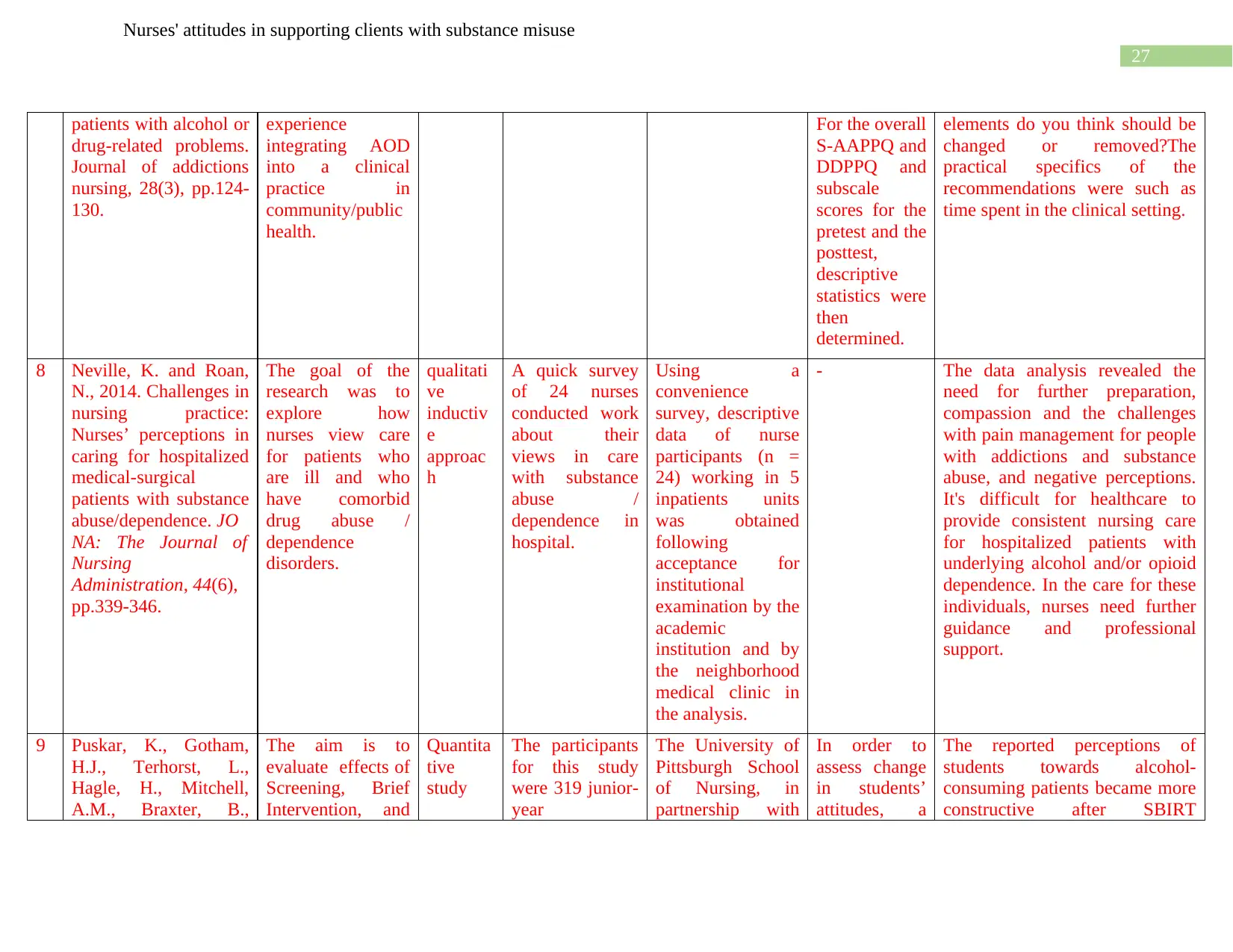
27
Nurses' attitudes in supporting clients with substance misuse
patients with alcohol or
drug-related problems.
Journal of addictions
nursing, 28(3), pp.124-
130.
experience
integrating AOD
into a clinical
practice in
community/public
health.
For the overall
S-AAPPQ and
DDPPQ and
subscale
scores for the
pretest and the
posttest,
descriptive
statistics were
then
determined.
elements do you think should be
changed or removed?The
practical specifics of the
recommendations were such as
time spent in the clinical setting.
8 Neville, K. and Roan,
N., 2014. Challenges in
nursing practice:
Nurses’ perceptions in
caring for hospitalized
medical-surgical
patients with substance
abuse/dependence. JO
NA: The Journal of
Nursing
Administration, 44(6),
pp.339-346.
The goal of the
research was to
explore how
nurses view care
for patients who
are ill and who
have comorbid
drug abuse /
dependence
disorders.
qualitati
ve
inductiv
e
approac
h
A quick survey
of 24 nurses
conducted work
about their
views in care
with substance
abuse /
dependence in
hospital.
Using a
convenience
survey, descriptive
data of nurse
participants (n =
24) working in 5
inpatients units
was obtained
following
acceptance for
institutional
examination by the
academic
institution and by
the neighborhood
medical clinic in
the analysis.
- The data analysis revealed the
need for further preparation,
compassion and the challenges
with pain management for people
with addictions and substance
abuse, and negative perceptions.
It's difficult for healthcare to
provide consistent nursing care
for hospitalized patients with
underlying alcohol and/or opioid
dependence. In the care for these
individuals, nurses need further
guidance and professional
support.
9 Puskar, K., Gotham,
H.J., Terhorst, L.,
Hagle, H., Mitchell,
A.M., Braxter, B.,
The aim is to
evaluate effects of
Screening, Brief
Intervention, and
Quantita
tive
study
The participants
for this study
were 319 junior-
year
The University of
Pittsburgh School
of Nursing, in
partnership with
In order to
assess change
in students’
attitudes, a
The reported perceptions of
students towards alcohol-
consuming patients became more
constructive after SBIRT
Nurses' attitudes in supporting clients with substance misuse
patients with alcohol or
drug-related problems.
Journal of addictions
nursing, 28(3), pp.124-
130.
experience
integrating AOD
into a clinical
practice in
community/public
health.
For the overall
S-AAPPQ and
DDPPQ and
subscale
scores for the
pretest and the
posttest,
descriptive
statistics were
then
determined.
elements do you think should be
changed or removed?The
practical specifics of the
recommendations were such as
time spent in the clinical setting.
8 Neville, K. and Roan,
N., 2014. Challenges in
nursing practice:
Nurses’ perceptions in
caring for hospitalized
medical-surgical
patients with substance
abuse/dependence. JO
NA: The Journal of
Nursing
Administration, 44(6),
pp.339-346.
The goal of the
research was to
explore how
nurses view care
for patients who
are ill and who
have comorbid
drug abuse /
dependence
disorders.
qualitati
ve
inductiv
e
approac
h
A quick survey
of 24 nurses
conducted work
about their
views in care
with substance
abuse /
dependence in
hospital.
Using a
convenience
survey, descriptive
data of nurse
participants (n =
24) working in 5
inpatients units
was obtained
following
acceptance for
institutional
examination by the
academic
institution and by
the neighborhood
medical clinic in
the analysis.
- The data analysis revealed the
need for further preparation,
compassion and the challenges
with pain management for people
with addictions and substance
abuse, and negative perceptions.
It's difficult for healthcare to
provide consistent nursing care
for hospitalized patients with
underlying alcohol and/or opioid
dependence. In the care for these
individuals, nurses need further
guidance and professional
support.
9 Puskar, K., Gotham,
H.J., Terhorst, L.,
Hagle, H., Mitchell,
A.M., Braxter, B.,
The aim is to
evaluate effects of
Screening, Brief
Intervention, and
Quantita
tive
study
The participants
for this study
were 319 junior-
year
The University of
Pittsburgh School
of Nursing, in
partnership with
In order to
assess change
in students’
attitudes, a
The reported perceptions of
students towards alcohol-
consuming patients became more
constructive after SBIRT
Secure Best Marks with AI Grader
Need help grading? Try our AI Grader for instant feedback on your assignments.
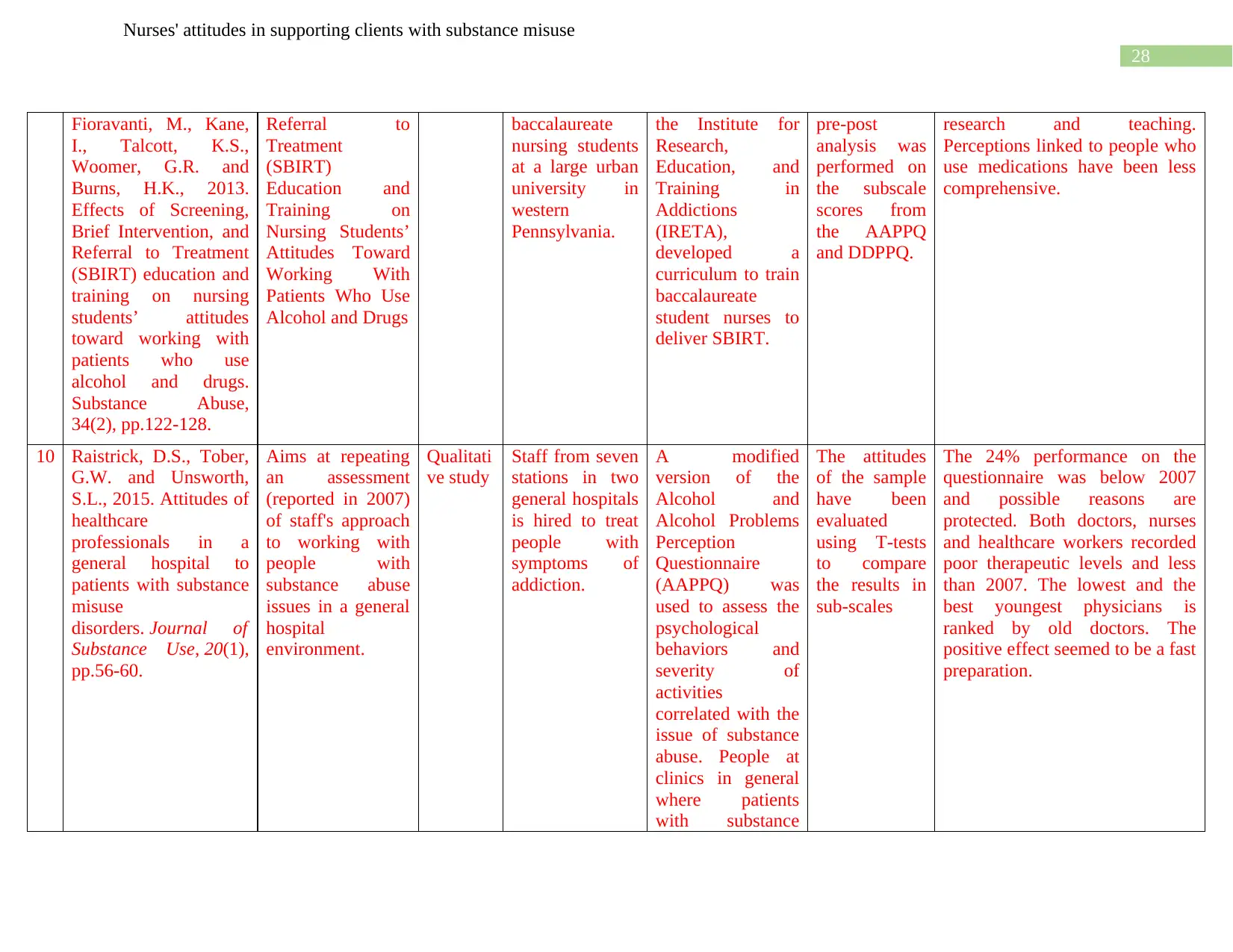
28
Nurses' attitudes in supporting clients with substance misuse
Fioravanti, M., Kane,
I., Talcott, K.S.,
Woomer, G.R. and
Burns, H.K., 2013.
Effects of Screening,
Brief Intervention, and
Referral to Treatment
(SBIRT) education and
training on nursing
students’ attitudes
toward working with
patients who use
alcohol and drugs.
Substance Abuse,
34(2), pp.122-128.
Referral to
Treatment
(SBIRT)
Education and
Training on
Nursing Students’
Attitudes Toward
Working With
Patients Who Use
Alcohol and Drugs
baccalaureate
nursing students
at a large urban
university in
western
Pennsylvania.
the Institute for
Research,
Education, and
Training in
Addictions
(IRETA),
developed a
curriculum to train
baccalaureate
student nurses to
deliver SBIRT.
pre-post
analysis was
performed on
the subscale
scores from
the AAPPQ
and DDPPQ.
research and teaching.
Perceptions linked to people who
use medications have been less
comprehensive.
10 Raistrick, D.S., Tober,
G.W. and Unsworth,
S.L., 2015. Attitudes of
healthcare
professionals in a
general hospital to
patients with substance
misuse
disorders. Journal of
Substance Use, 20(1),
pp.56-60.
Aims at repeating
an assessment
(reported in 2007)
of staff's approach
to working with
people with
substance abuse
issues in a general
hospital
environment.
Qualitati
ve study
Staff from seven
stations in two
general hospitals
is hired to treat
people with
symptoms of
addiction.
A modified
version of the
Alcohol and
Alcohol Problems
Perception
Questionnaire
(AAPPQ) was
used to assess the
psychological
behaviors and
severity of
activities
correlated with the
issue of substance
abuse. People at
clinics in general
where patients
with substance
The attitudes
of the sample
have been
evaluated
using T-tests
to compare
the results in
sub-scales
The 24% performance on the
questionnaire was below 2007
and possible reasons are
protected. Both doctors, nurses
and healthcare workers recorded
poor therapeutic levels and less
than 2007. The lowest and the
best youngest physicians is
ranked by old doctors. The
positive effect seemed to be a fast
preparation.
Nurses' attitudes in supporting clients with substance misuse
Fioravanti, M., Kane,
I., Talcott, K.S.,
Woomer, G.R. and
Burns, H.K., 2013.
Effects of Screening,
Brief Intervention, and
Referral to Treatment
(SBIRT) education and
training on nursing
students’ attitudes
toward working with
patients who use
alcohol and drugs.
Substance Abuse,
34(2), pp.122-128.
Referral to
Treatment
(SBIRT)
Education and
Training on
Nursing Students’
Attitudes Toward
Working With
Patients Who Use
Alcohol and Drugs
baccalaureate
nursing students
at a large urban
university in
western
Pennsylvania.
the Institute for
Research,
Education, and
Training in
Addictions
(IRETA),
developed a
curriculum to train
baccalaureate
student nurses to
deliver SBIRT.
pre-post
analysis was
performed on
the subscale
scores from
the AAPPQ
and DDPPQ.
research and teaching.
Perceptions linked to people who
use medications have been less
comprehensive.
10 Raistrick, D.S., Tober,
G.W. and Unsworth,
S.L., 2015. Attitudes of
healthcare
professionals in a
general hospital to
patients with substance
misuse
disorders. Journal of
Substance Use, 20(1),
pp.56-60.
Aims at repeating
an assessment
(reported in 2007)
of staff's approach
to working with
people with
substance abuse
issues in a general
hospital
environment.
Qualitati
ve study
Staff from seven
stations in two
general hospitals
is hired to treat
people with
symptoms of
addiction.
A modified
version of the
Alcohol and
Alcohol Problems
Perception
Questionnaire
(AAPPQ) was
used to assess the
psychological
behaviors and
severity of
activities
correlated with the
issue of substance
abuse. People at
clinics in general
where patients
with substance
The attitudes
of the sample
have been
evaluated
using T-tests
to compare
the results in
sub-scales
The 24% performance on the
questionnaire was below 2007
and possible reasons are
protected. Both doctors, nurses
and healthcare workers recorded
poor therapeutic levels and less
than 2007. The lowest and the
best youngest physicians is
ranked by old doctors. The
positive effect seemed to be a fast
preparation.
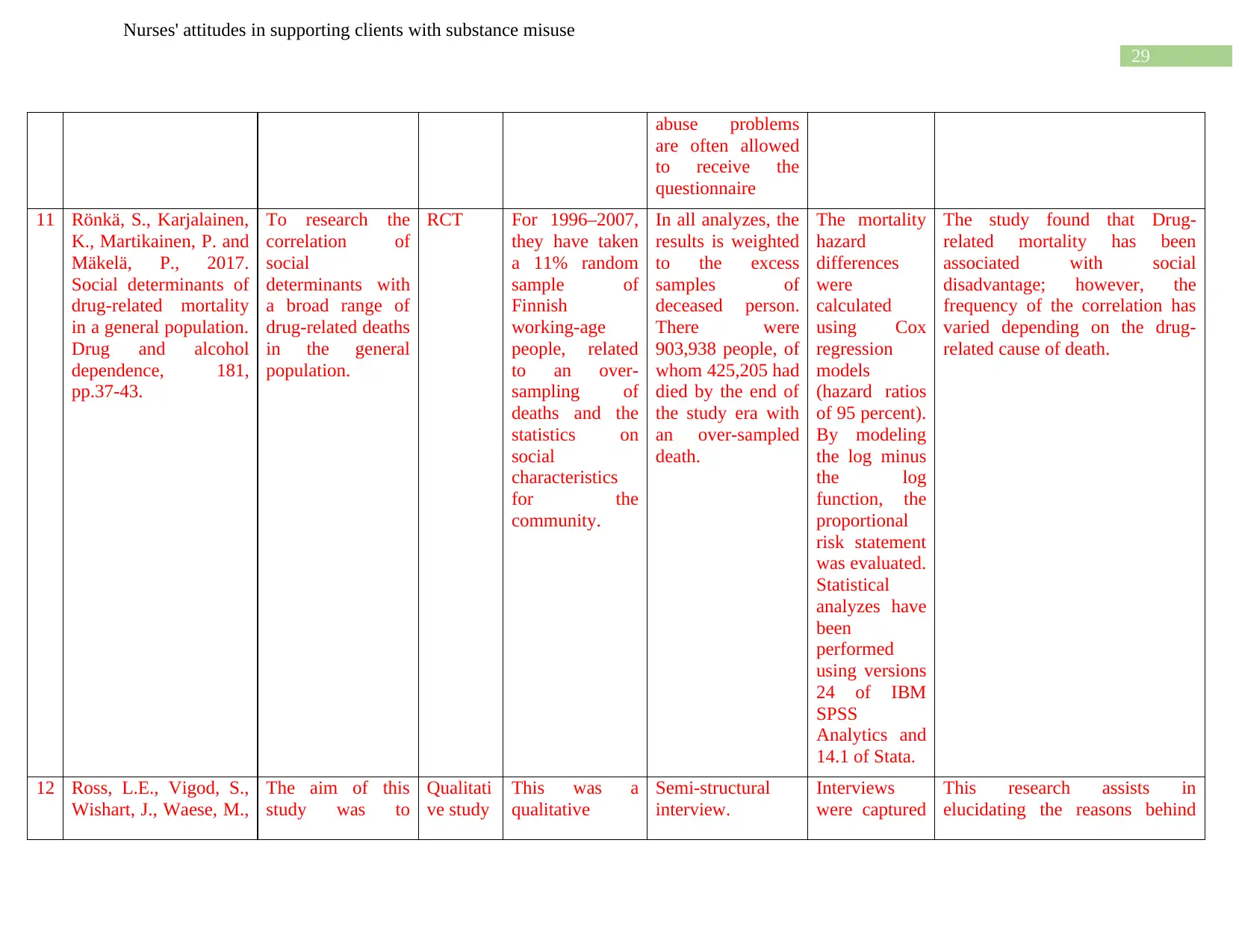
29
Nurses' attitudes in supporting clients with substance misuse
abuse problems
are often allowed
to receive the
questionnaire
11 Rönkä, S., Karjalainen,
K., Martikainen, P. and
Mäkelä, P., 2017.
Social determinants of
drug-related mortality
in a general population.
Drug and alcohol
dependence, 181,
pp.37-43.
To research the
correlation of
social
determinants with
a broad range of
drug-related deaths
in the general
population.
RCT For 1996–2007,
they have taken
a 11% random
sample of
Finnish
working-age
people, related
to an over-
sampling of
deaths and the
statistics on
social
characteristics
for the
community.
In all analyzes, the
results is weighted
to the excess
samples of
deceased person.
There were
903,938 people, of
whom 425,205 had
died by the end of
the study era with
an over-sampled
death.
The mortality
hazard
differences
were
calculated
using Cox
regression
models
(hazard ratios
of 95 percent).
By modeling
the log minus
the log
function, the
proportional
risk statement
was evaluated.
Statistical
analyzes have
been
performed
using versions
24 of IBM
SPSS
Analytics and
14.1 of Stata.
The study found that Drug-
related mortality has been
associated with social
disadvantage; however, the
frequency of the correlation has
varied depending on the drug-
related cause of death.
12 Ross, L.E., Vigod, S.,
Wishart, J., Waese, M.,
The aim of this
study was to
Qualitati
ve study
This was a
qualitative
Semi-structural
interview.
Interviews
were captured
This research assists in
elucidating the reasons behind
Nurses' attitudes in supporting clients with substance misuse
abuse problems
are often allowed
to receive the
questionnaire
11 Rönkä, S., Karjalainen,
K., Martikainen, P. and
Mäkelä, P., 2017.
Social determinants of
drug-related mortality
in a general population.
Drug and alcohol
dependence, 181,
pp.37-43.
To research the
correlation of
social
determinants with
a broad range of
drug-related deaths
in the general
population.
RCT For 1996–2007,
they have taken
a 11% random
sample of
Finnish
working-age
people, related
to an over-
sampling of
deaths and the
statistics on
social
characteristics
for the
community.
In all analyzes, the
results is weighted
to the excess
samples of
deceased person.
There were
903,938 people, of
whom 425,205 had
died by the end of
the study era with
an over-sampled
death.
The mortality
hazard
differences
were
calculated
using Cox
regression
models
(hazard ratios
of 95 percent).
By modeling
the log minus
the log
function, the
proportional
risk statement
was evaluated.
Statistical
analyzes have
been
performed
using versions
24 of IBM
SPSS
Analytics and
14.1 of Stata.
The study found that Drug-
related mortality has been
associated with social
disadvantage; however, the
frequency of the correlation has
varied depending on the drug-
related cause of death.
12 Ross, L.E., Vigod, S.,
Wishart, J., Waese, M.,
The aim of this
study was to
Qualitati
ve study
This was a
qualitative
Semi-structural
interview.
Interviews
were captured
This research assists in
elucidating the reasons behind
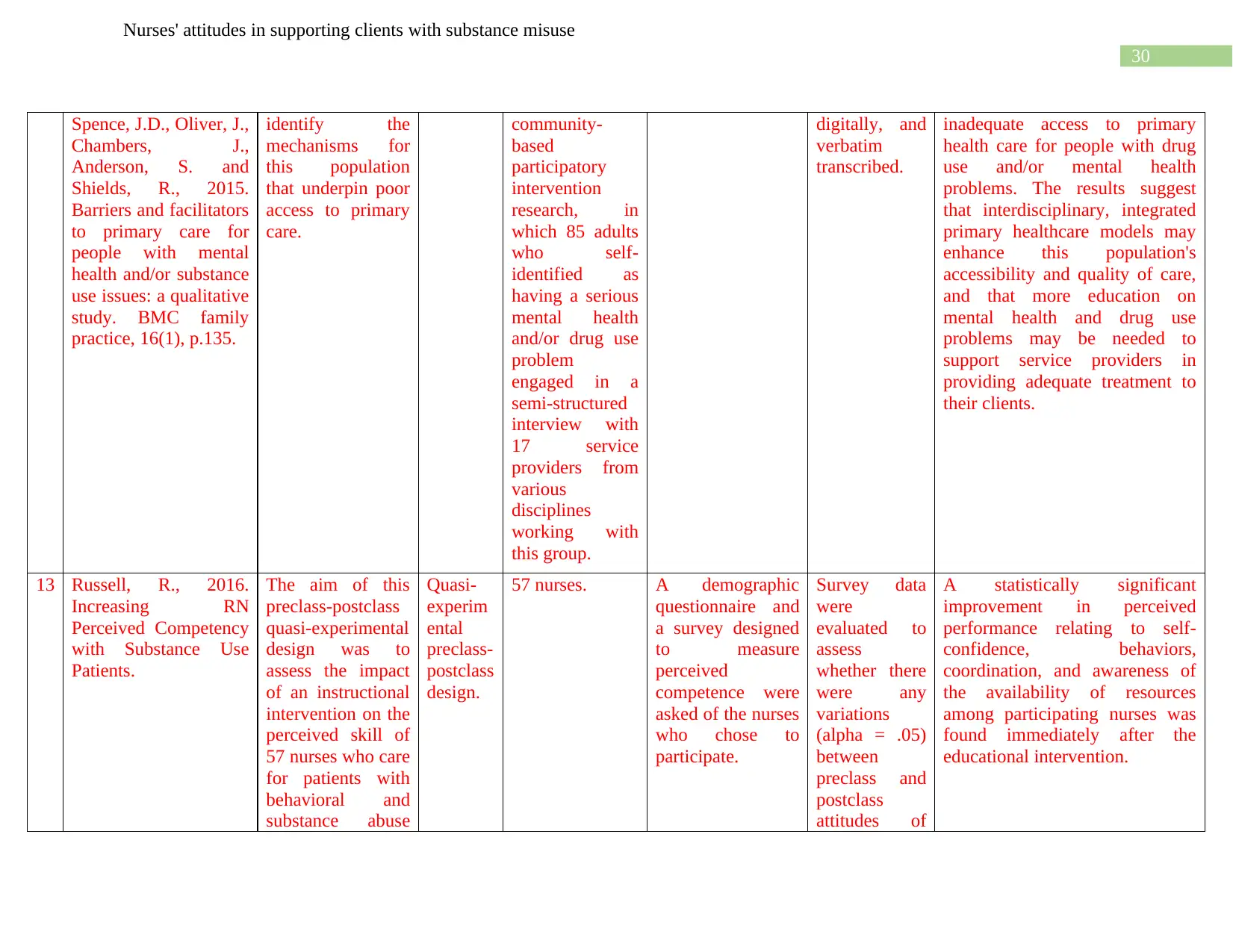
30
Nurses' attitudes in supporting clients with substance misuse
Spence, J.D., Oliver, J.,
Chambers, J.,
Anderson, S. and
Shields, R., 2015.
Barriers and facilitators
to primary care for
people with mental
health and/or substance
use issues: a qualitative
study. BMC family
practice, 16(1), p.135.
identify the
mechanisms for
this population
that underpin poor
access to primary
care.
community-
based
participatory
intervention
research, in
which 85 adults
who self-
identified as
having a serious
mental health
and/or drug use
problem
engaged in a
semi-structured
interview with
17 service
providers from
various
disciplines
working with
this group.
digitally, and
verbatim
transcribed.
inadequate access to primary
health care for people with drug
use and/or mental health
problems. The results suggest
that interdisciplinary, integrated
primary healthcare models may
enhance this population's
accessibility and quality of care,
and that more education on
mental health and drug use
problems may be needed to
support service providers in
providing adequate treatment to
their clients.
13 Russell, R., 2016.
Increasing RN
Perceived Competency
with Substance Use
Patients.
The aim of this
preclass-postclass
quasi-experimental
design was to
assess the impact
of an instructional
intervention on the
perceived skill of
57 nurses who care
for patients with
behavioral and
substance abuse
Quasi-
experim
ental
preclass-
postclass
design.
57 nurses. A demographic
questionnaire and
a survey designed
to measure
perceived
competence were
asked of the nurses
who chose to
participate.
Survey data
were
evaluated to
assess
whether there
were any
variations
(alpha = .05)
between
preclass and
postclass
attitudes of
A statistically significant
improvement in perceived
performance relating to self-
confidence, behaviors,
coordination, and awareness of
the availability of resources
among participating nurses was
found immediately after the
educational intervention.
Nurses' attitudes in supporting clients with substance misuse
Spence, J.D., Oliver, J.,
Chambers, J.,
Anderson, S. and
Shields, R., 2015.
Barriers and facilitators
to primary care for
people with mental
health and/or substance
use issues: a qualitative
study. BMC family
practice, 16(1), p.135.
identify the
mechanisms for
this population
that underpin poor
access to primary
care.
community-
based
participatory
intervention
research, in
which 85 adults
who self-
identified as
having a serious
mental health
and/or drug use
problem
engaged in a
semi-structured
interview with
17 service
providers from
various
disciplines
working with
this group.
digitally, and
verbatim
transcribed.
inadequate access to primary
health care for people with drug
use and/or mental health
problems. The results suggest
that interdisciplinary, integrated
primary healthcare models may
enhance this population's
accessibility and quality of care,
and that more education on
mental health and drug use
problems may be needed to
support service providers in
providing adequate treatment to
their clients.
13 Russell, R., 2016.
Increasing RN
Perceived Competency
with Substance Use
Patients.
The aim of this
preclass-postclass
quasi-experimental
design was to
assess the impact
of an instructional
intervention on the
perceived skill of
57 nurses who care
for patients with
behavioral and
substance abuse
Quasi-
experim
ental
preclass-
postclass
design.
57 nurses. A demographic
questionnaire and
a survey designed
to measure
perceived
competence were
asked of the nurses
who chose to
participate.
Survey data
were
evaluated to
assess
whether there
were any
variations
(alpha = .05)
between
preclass and
postclass
attitudes of
A statistically significant
improvement in perceived
performance relating to self-
confidence, behaviors,
coordination, and awareness of
the availability of resources
among participating nurses was
found immediately after the
educational intervention.
Paraphrase This Document
Need a fresh take? Get an instant paraphrase of this document with our AI Paraphraser
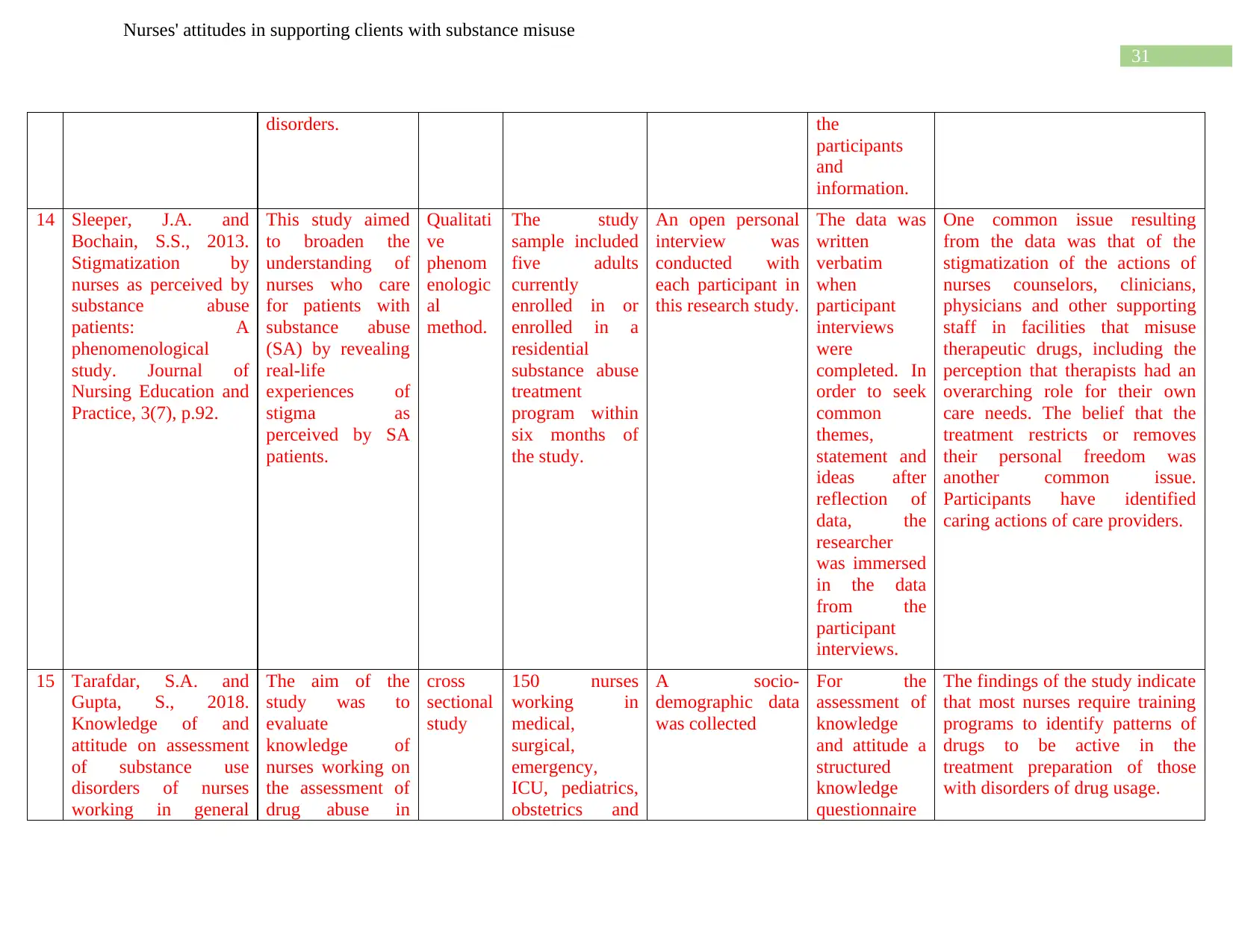
31
Nurses' attitudes in supporting clients with substance misuse
disorders. the
participants
and
information.
14 Sleeper, J.A. and
Bochain, S.S., 2013.
Stigmatization by
nurses as perceived by
substance abuse
patients: A
phenomenological
study. Journal of
Nursing Education and
Practice, 3(7), p.92.
This study aimed
to broaden the
understanding of
nurses who care
for patients with
substance abuse
(SA) by revealing
real-life
experiences of
stigma as
perceived by SA
patients.
Qualitati
ve
phenom
enologic
al
method.
The study
sample included
five adults
currently
enrolled in or
enrolled in a
residential
substance abuse
treatment
program within
six months of
the study.
An open personal
interview was
conducted with
each participant in
this research study.
The data was
written
verbatim
when
participant
interviews
were
completed. In
order to seek
common
themes,
statement and
ideas after
reflection of
data, the
researcher
was immersed
in the data
from the
participant
interviews.
One common issue resulting
from the data was that of the
stigmatization of the actions of
nurses counselors, clinicians,
physicians and other supporting
staff in facilities that misuse
therapeutic drugs, including the
perception that therapists had an
overarching role for their own
care needs. The belief that the
treatment restricts or removes
their personal freedom was
another common issue.
Participants have identified
caring actions of care providers.
15 Tarafdar, S.A. and
Gupta, S., 2018.
Knowledge of and
attitude on assessment
of substance use
disorders of nurses
working in general
The aim of the
study was to
evaluate
knowledge of
nurses working on
the assessment of
drug abuse in
cross
sectional
study
150 nurses
working in
medical,
surgical,
emergency,
ICU, pediatrics,
obstetrics and
A socio-
demographic data
was collected
For the
assessment of
knowledge
and attitude a
structured
knowledge
questionnaire
The findings of the study indicate
that most nurses require training
programs to identify patterns of
drugs to be active in the
treatment preparation of those
with disorders of drug usage.
Nurses' attitudes in supporting clients with substance misuse
disorders. the
participants
and
information.
14 Sleeper, J.A. and
Bochain, S.S., 2013.
Stigmatization by
nurses as perceived by
substance abuse
patients: A
phenomenological
study. Journal of
Nursing Education and
Practice, 3(7), p.92.
This study aimed
to broaden the
understanding of
nurses who care
for patients with
substance abuse
(SA) by revealing
real-life
experiences of
stigma as
perceived by SA
patients.
Qualitati
ve
phenom
enologic
al
method.
The study
sample included
five adults
currently
enrolled in or
enrolled in a
residential
substance abuse
treatment
program within
six months of
the study.
An open personal
interview was
conducted with
each participant in
this research study.
The data was
written
verbatim
when
participant
interviews
were
completed. In
order to seek
common
themes,
statement and
ideas after
reflection of
data, the
researcher
was immersed
in the data
from the
participant
interviews.
One common issue resulting
from the data was that of the
stigmatization of the actions of
nurses counselors, clinicians,
physicians and other supporting
staff in facilities that misuse
therapeutic drugs, including the
perception that therapists had an
overarching role for their own
care needs. The belief that the
treatment restricts or removes
their personal freedom was
another common issue.
Participants have identified
caring actions of care providers.
15 Tarafdar, S.A. and
Gupta, S., 2018.
Knowledge of and
attitude on assessment
of substance use
disorders of nurses
working in general
The aim of the
study was to
evaluate
knowledge of
nurses working on
the assessment of
drug abuse in
cross
sectional
study
150 nurses
working in
medical,
surgical,
emergency,
ICU, pediatrics,
obstetrics and
A socio-
demographic data
was collected
For the
assessment of
knowledge
and attitude a
structured
knowledge
questionnaire
The findings of the study indicate
that most nurses require training
programs to identify patterns of
drugs to be active in the
treatment preparation of those
with disorders of drug usage.
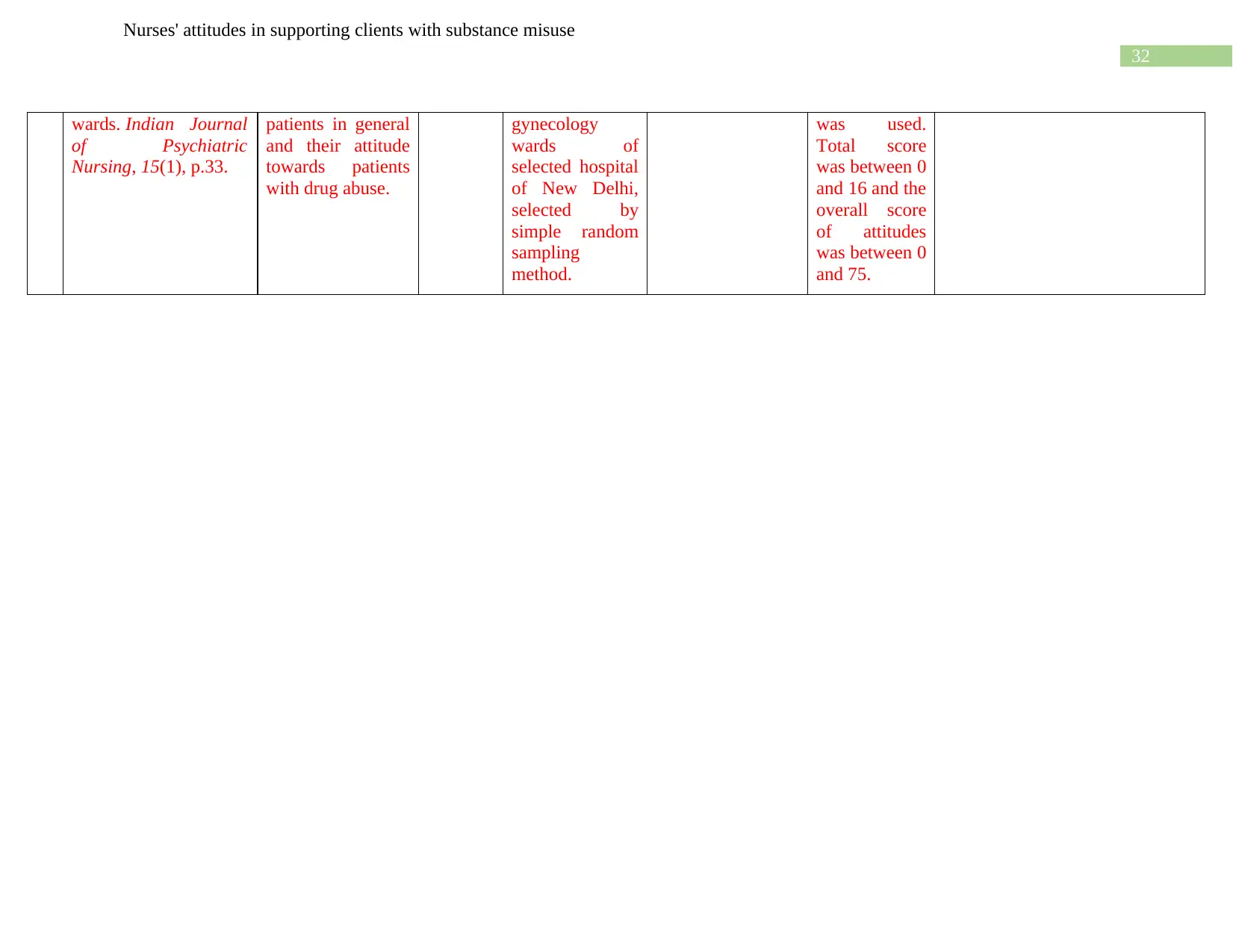
32
Nurses' attitudes in supporting clients with substance misuse
wards. Indian Journal
of Psychiatric
Nursing, 15(1), p.33.
patients in general
and their attitude
towards patients
with drug abuse.
gynecology
wards of
selected hospital
of New Delhi,
selected by
simple random
sampling
method.
was used.
Total score
was between 0
and 16 and the
overall score
of attitudes
was between 0
and 75.
Nurses' attitudes in supporting clients with substance misuse
wards. Indian Journal
of Psychiatric
Nursing, 15(1), p.33.
patients in general
and their attitude
towards patients
with drug abuse.
gynecology
wards of
selected hospital
of New Delhi,
selected by
simple random
sampling
method.
was used.
Total score
was between 0
and 16 and the
overall score
of attitudes
was between 0
and 75.
1 out of 33
Related Documents
Your All-in-One AI-Powered Toolkit for Academic Success.
+13062052269
info@desklib.com
Available 24*7 on WhatsApp / Email
![[object Object]](/_next/static/media/star-bottom.7253800d.svg)
Unlock your academic potential
© 2024 | Zucol Services PVT LTD | All rights reserved.





